- Home
- Resources
- Work samples
- Samples
- Design project: Desktop lamp - BELOW
Design and Technologies
Years 7 and 8
Below satisfactory
Design project: Desktop lamp
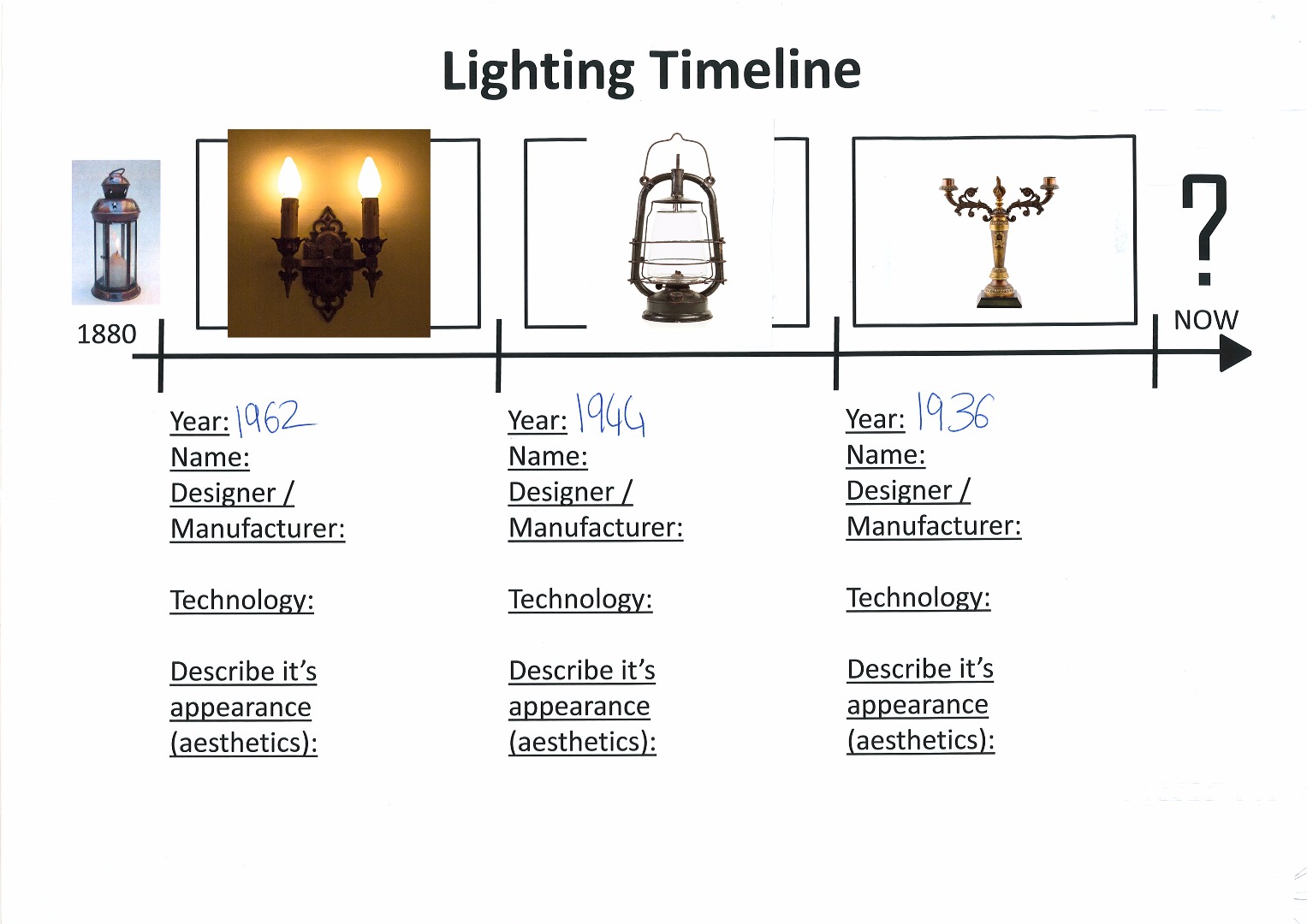
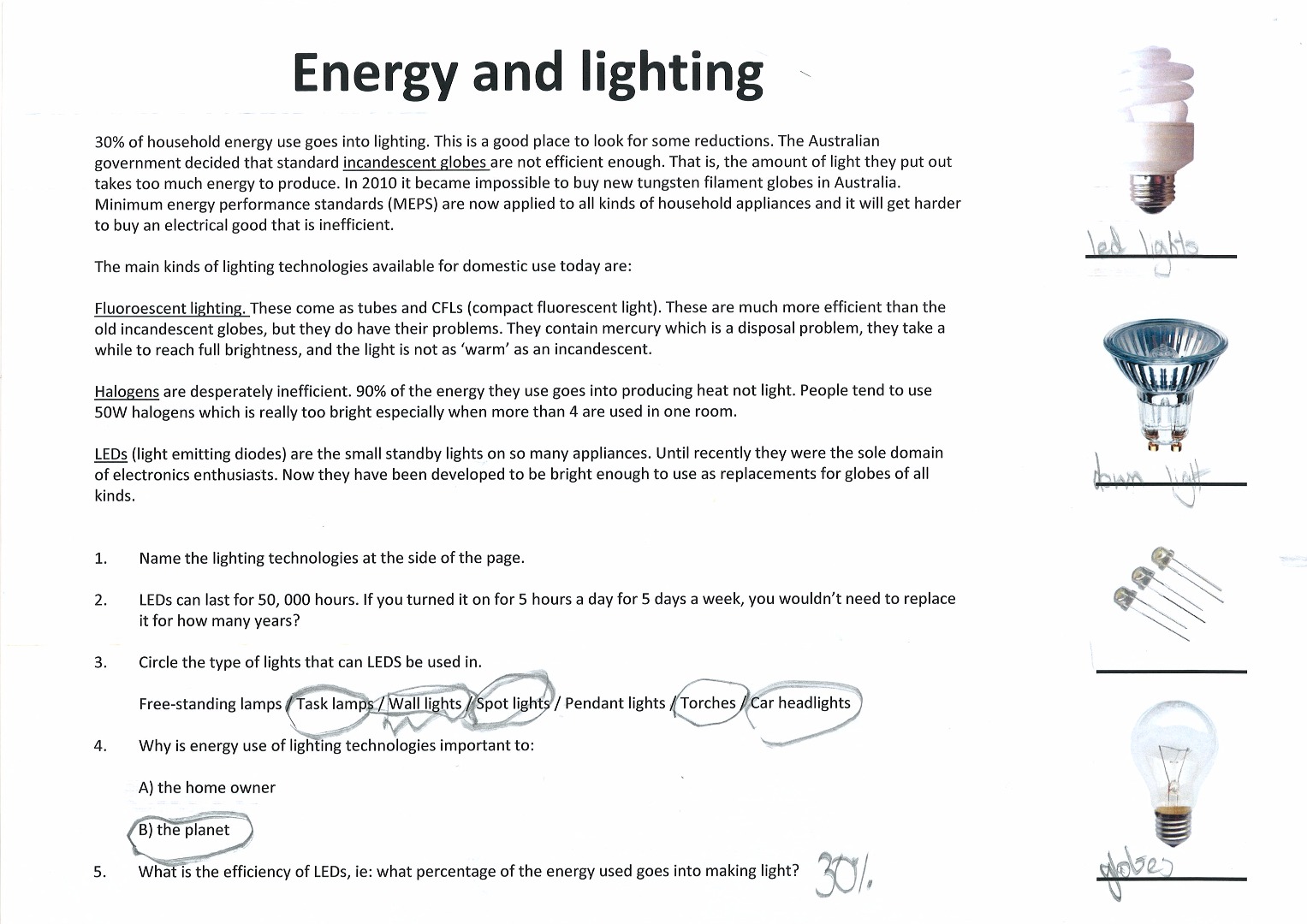 1
Annotation 1
1
Annotation 1
Uses generic terms to label some lighting technologies
-
Annotations
-
1
Annotation 1
Uses generic terms to label some lighting technologies
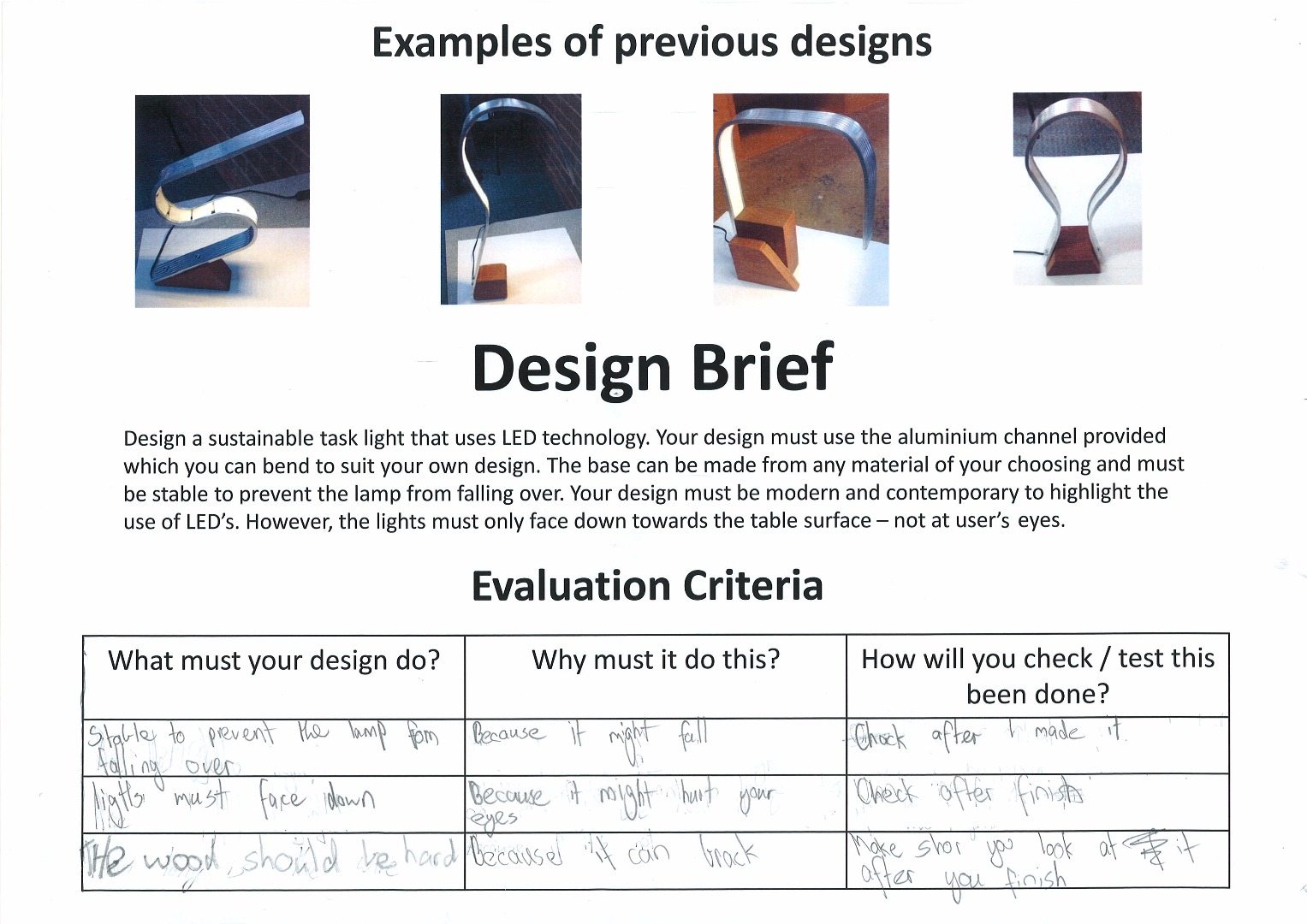 1
Annotation 1
1
Annotation 1
Indicates how the requirements will be evaluated 2 Annotation 2
Identifies a functional requirement for the solution to be designed 3 Annotation 3
Explains the importance of the requirements that have been identified
-
Annotations
-
1
Annotation 1
Indicates how the requirements will be evaluated -
2
Annotation 2
Identifies a functional requirement for the solution to be designed -
3
Annotation 3
Explains the importance of the requirements that have been identified
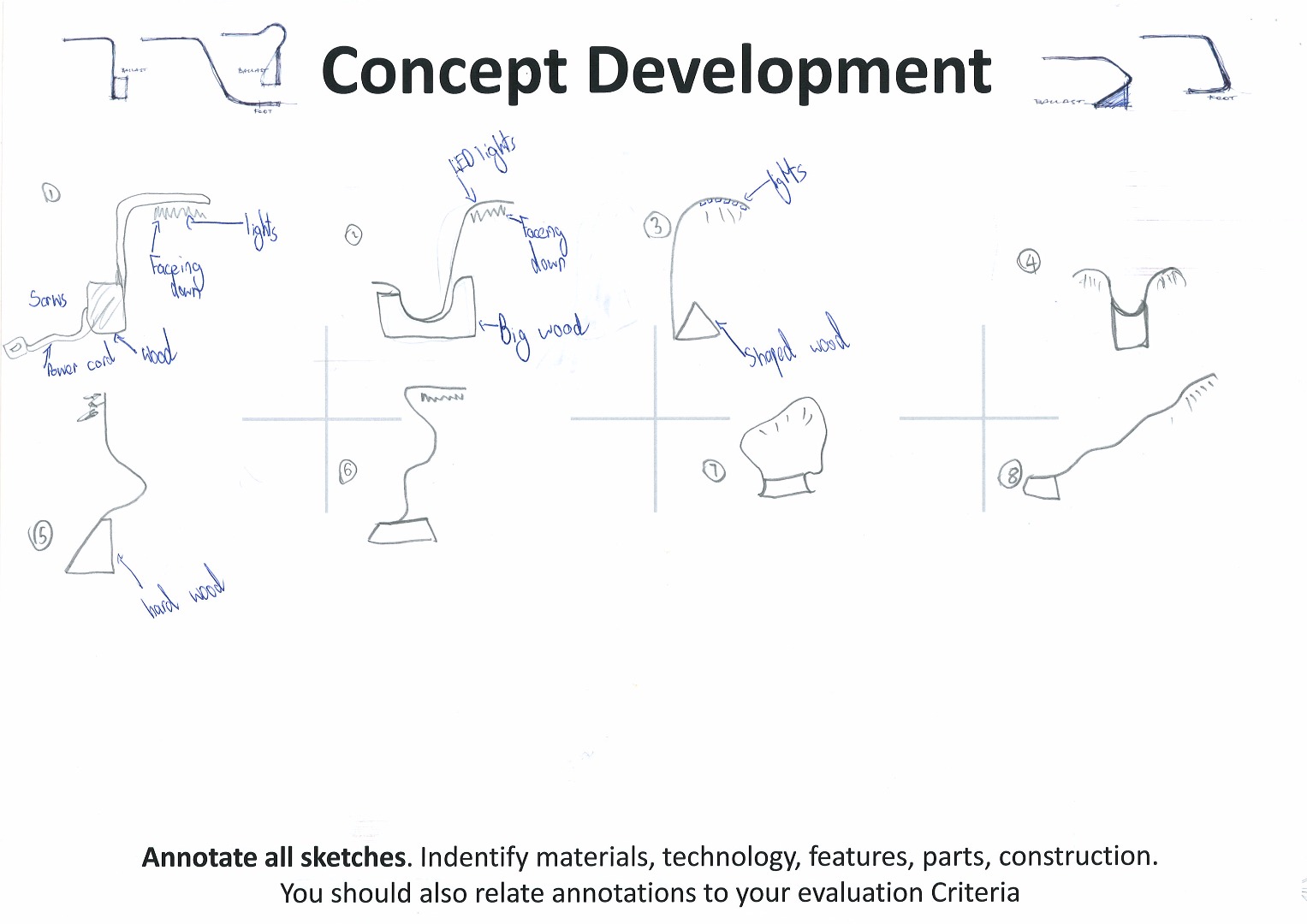 1
Annotation 1
1
Annotation 1
Produces line drawings of some design ideas and annotates them to indicate some materials and components
-
Annotations
-
1
Annotation 1
Produces line drawings of some design ideas and annotates them to indicate some materials and components
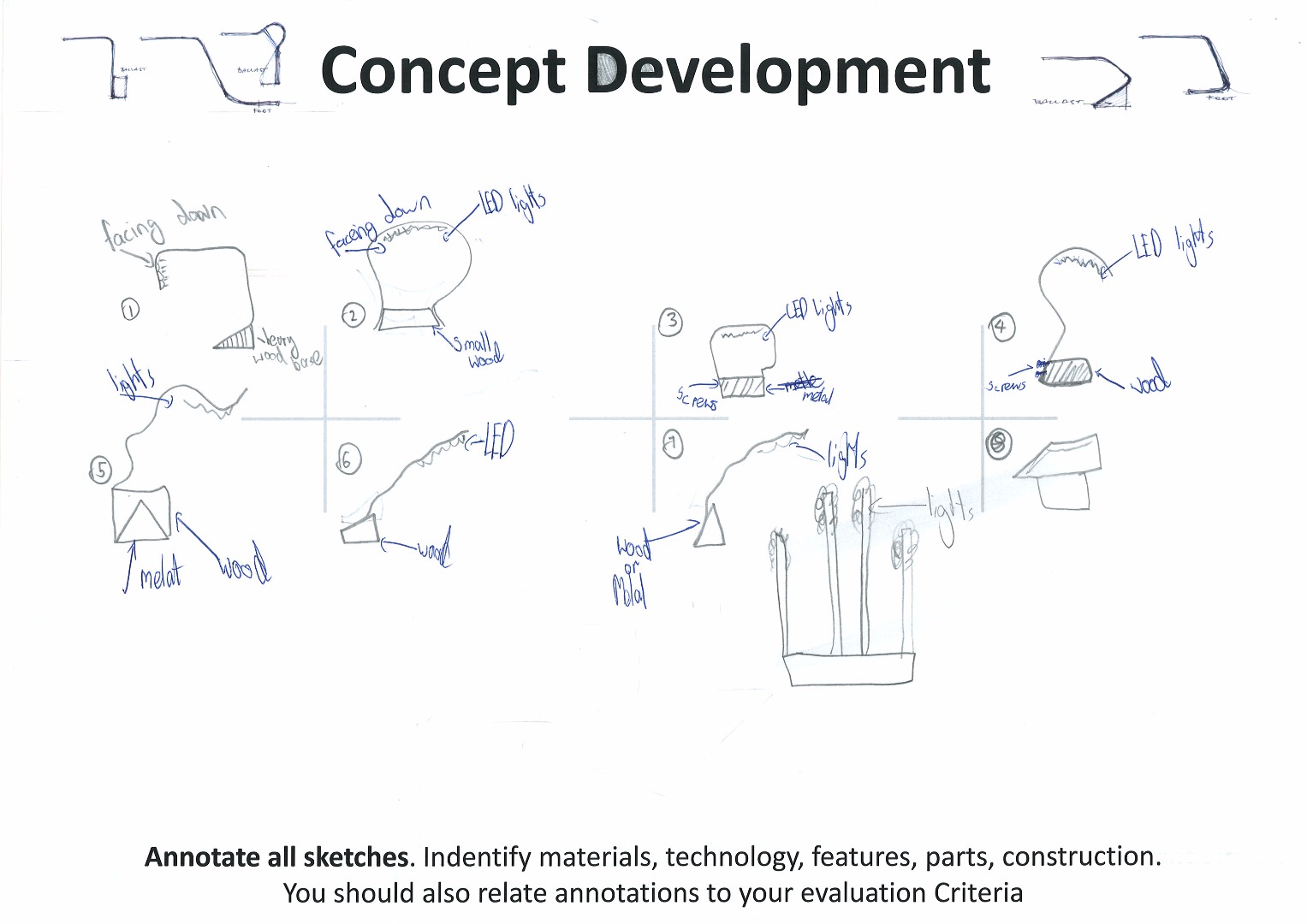 1
Annotation 1
1
Annotation 1
Uses drawings and annotations to refine design ideas
-
Annotations
-
1
Annotation 1
Uses drawings and annotations to refine design ideas
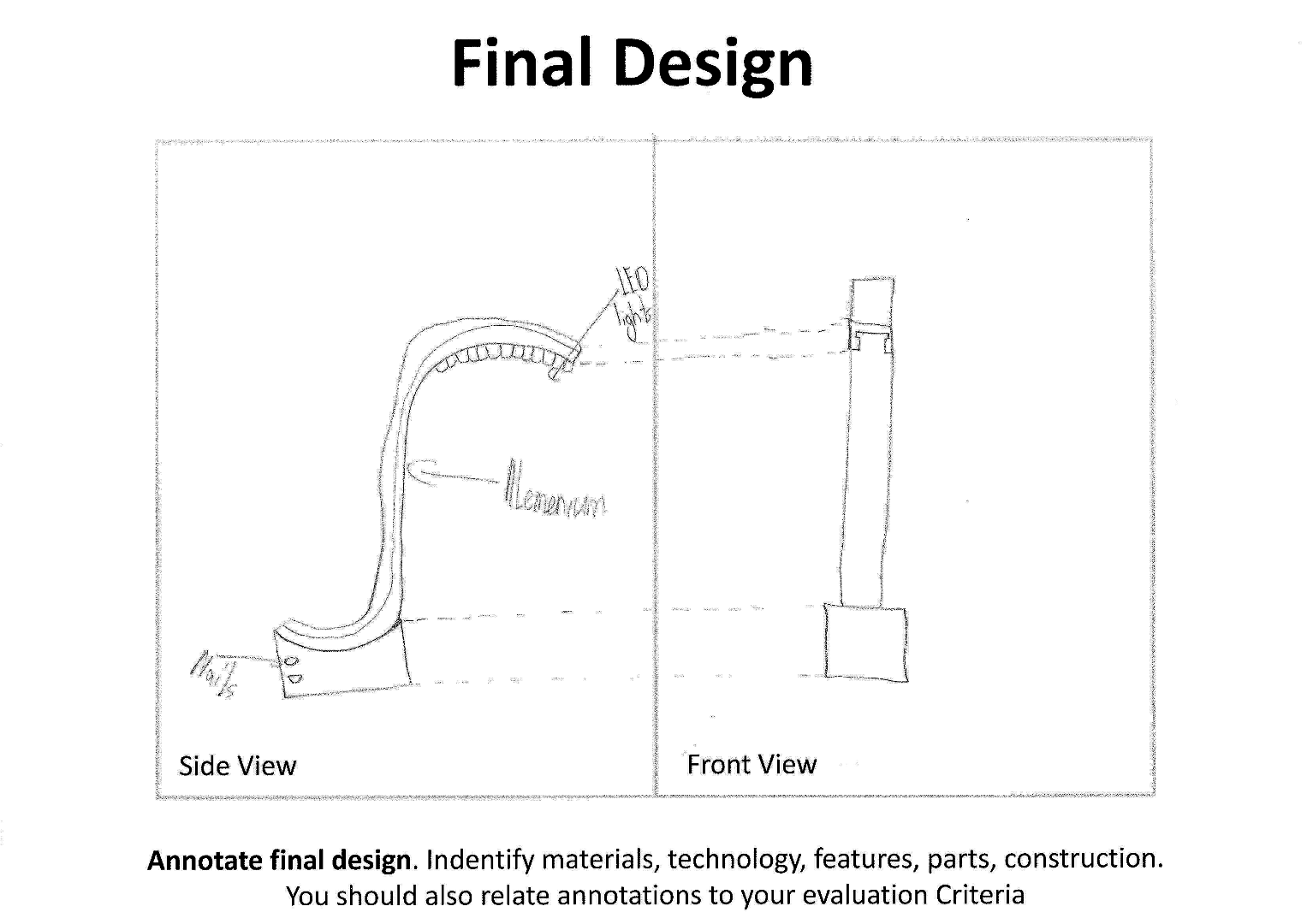 1
Annotation 1
1
Annotation 1
Sketches a side view and front view of the designed solution
-
Annotations
-
1
Annotation 1
Sketches a side view and front view of the designed solution
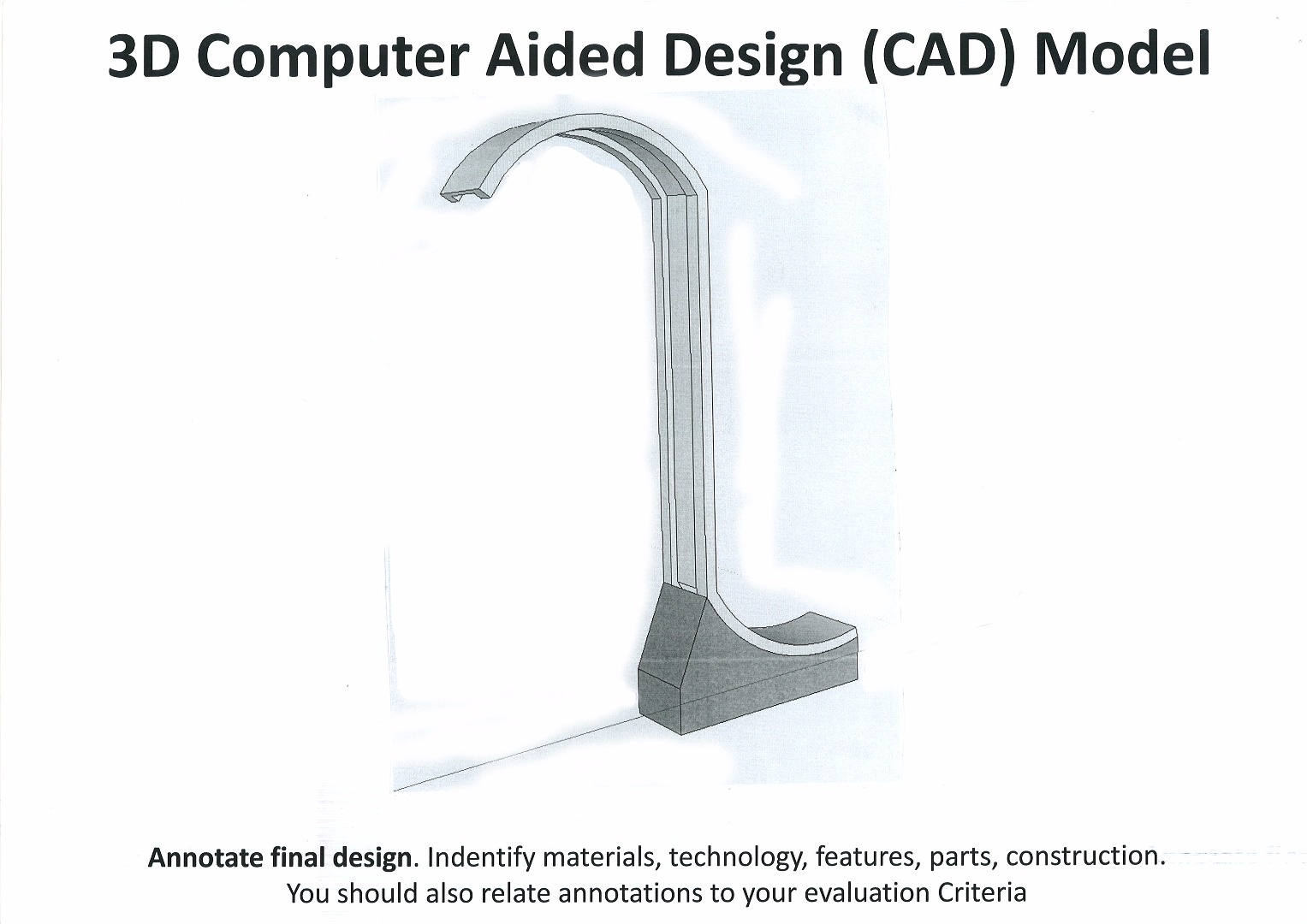
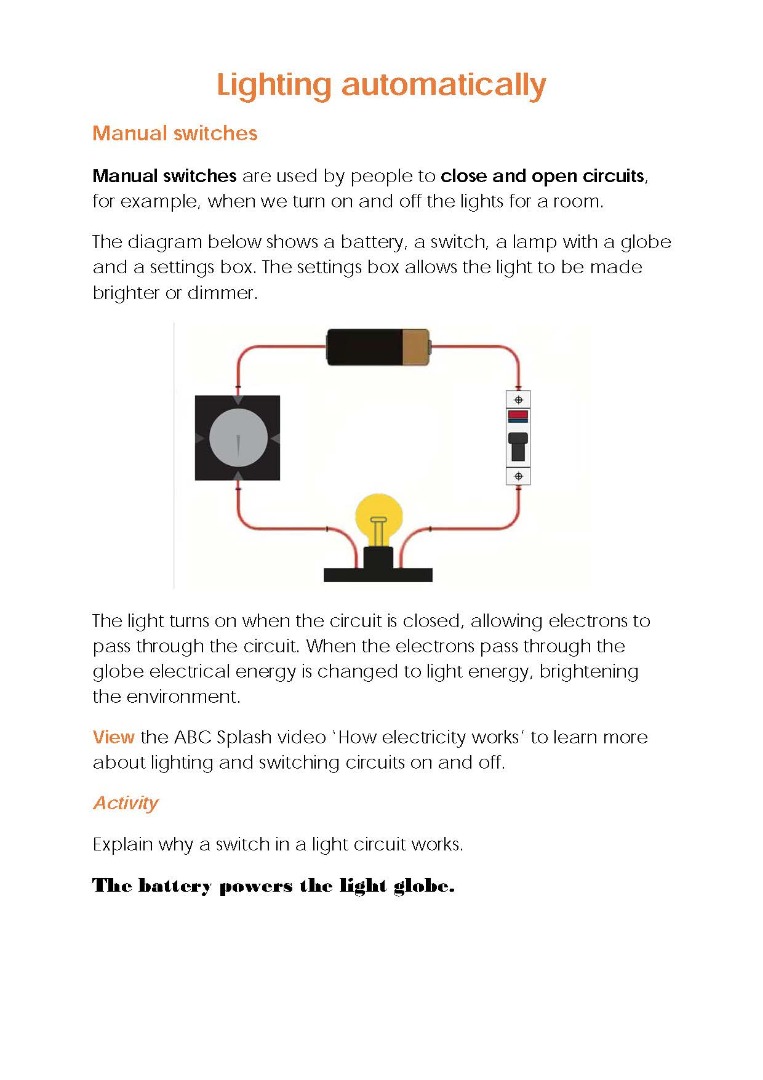 1
Annotation 1
1
Annotation 1
States the relationship between two components of a light circuit
-
Annotations
-
1
Annotation 1
States the relationship between two components of a light circuit
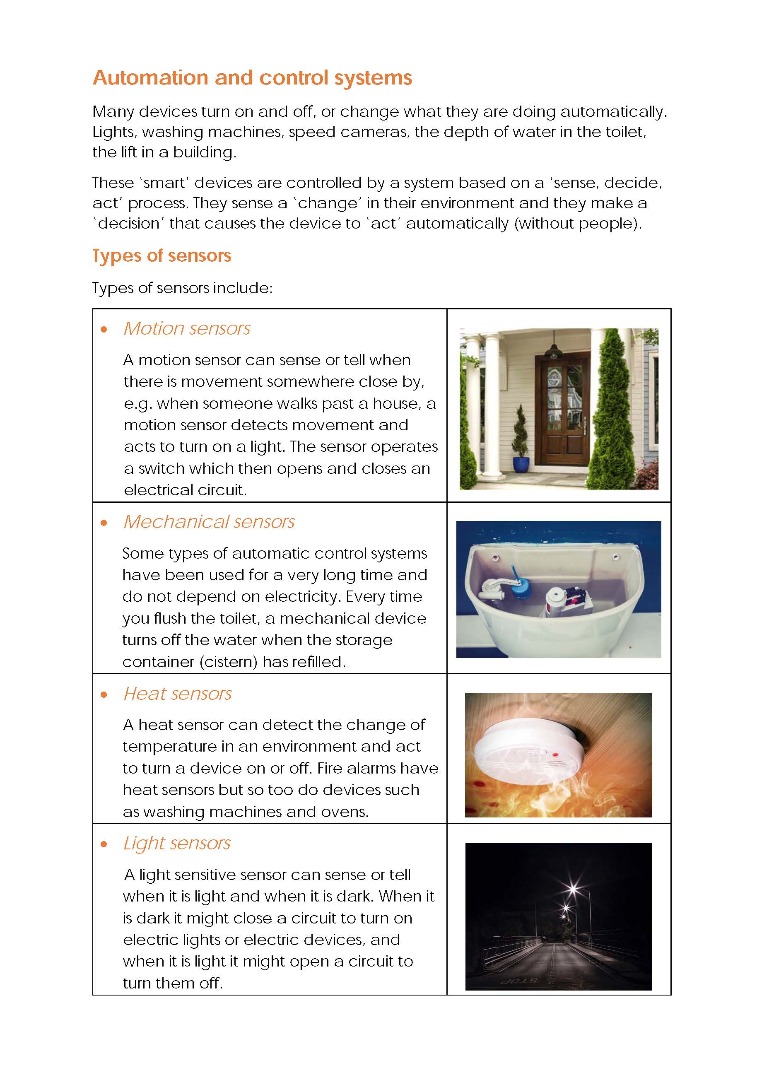
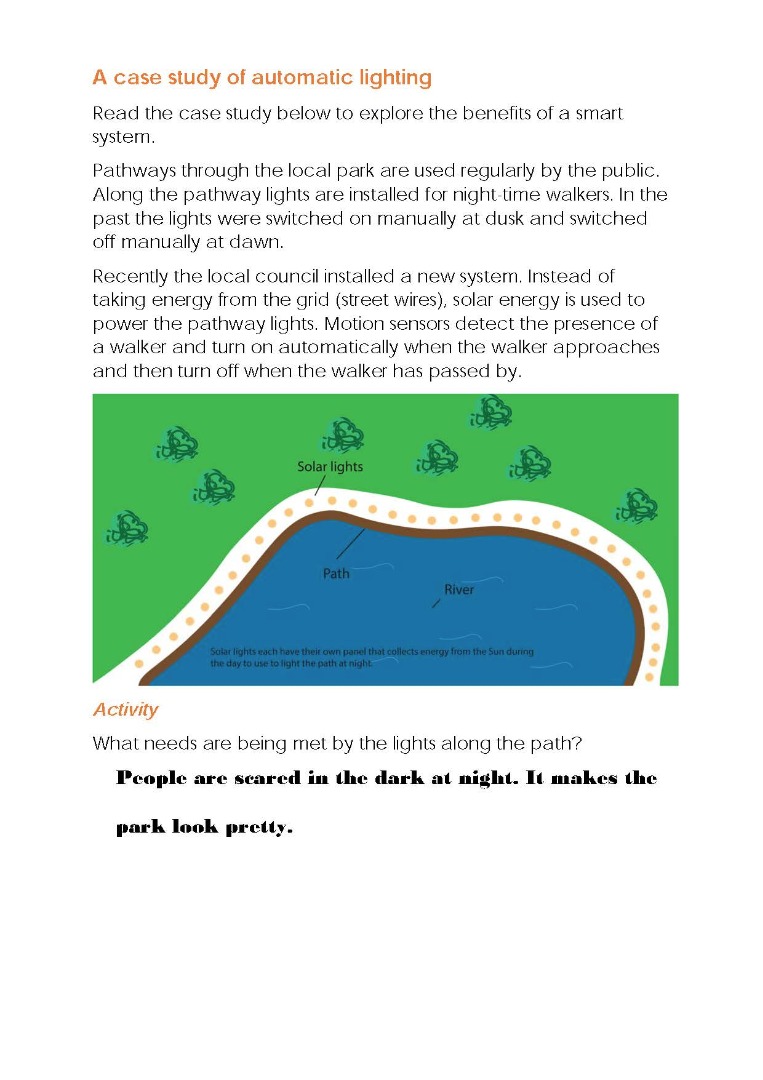 1
Annotation 1
1
Annotation 1
States a reason for the lights
-
Annotations
-
1
Annotation 1
States a reason for the lights
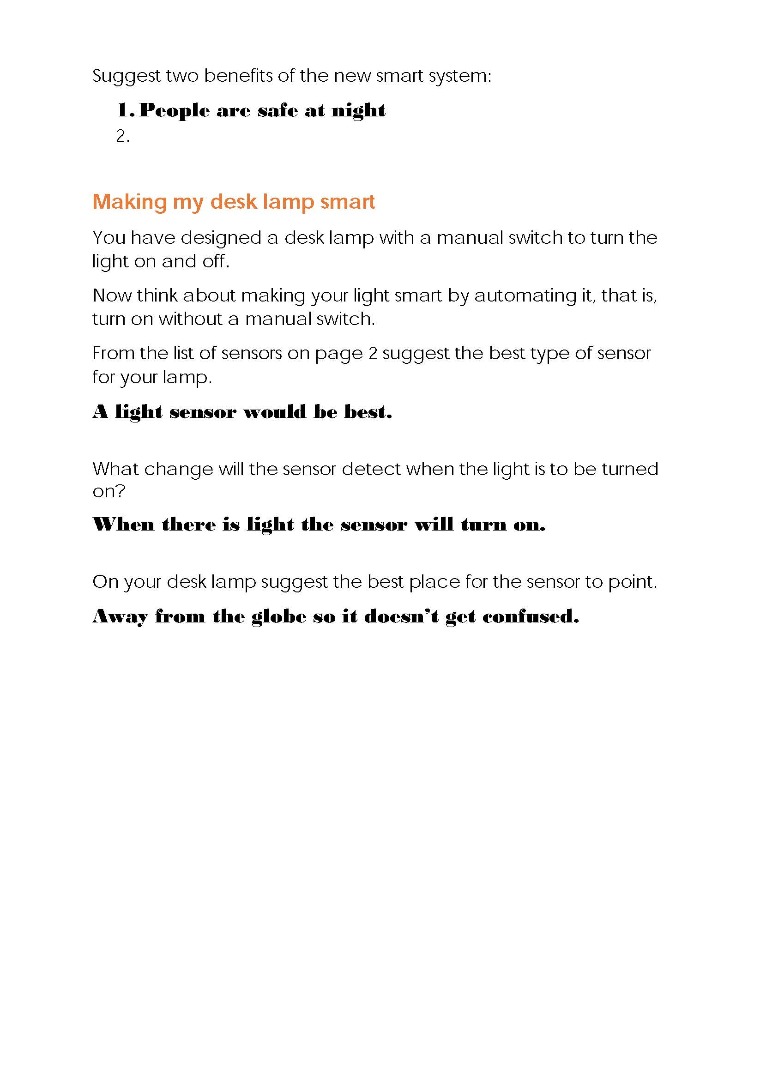 1
Annotation 1
1
Annotation 1
Identifies a benefit of the control system
-
Annotations
-
1
Annotation 1
Identifies a benefit of the control system
Satisfactory
Design project: Desktop lamp
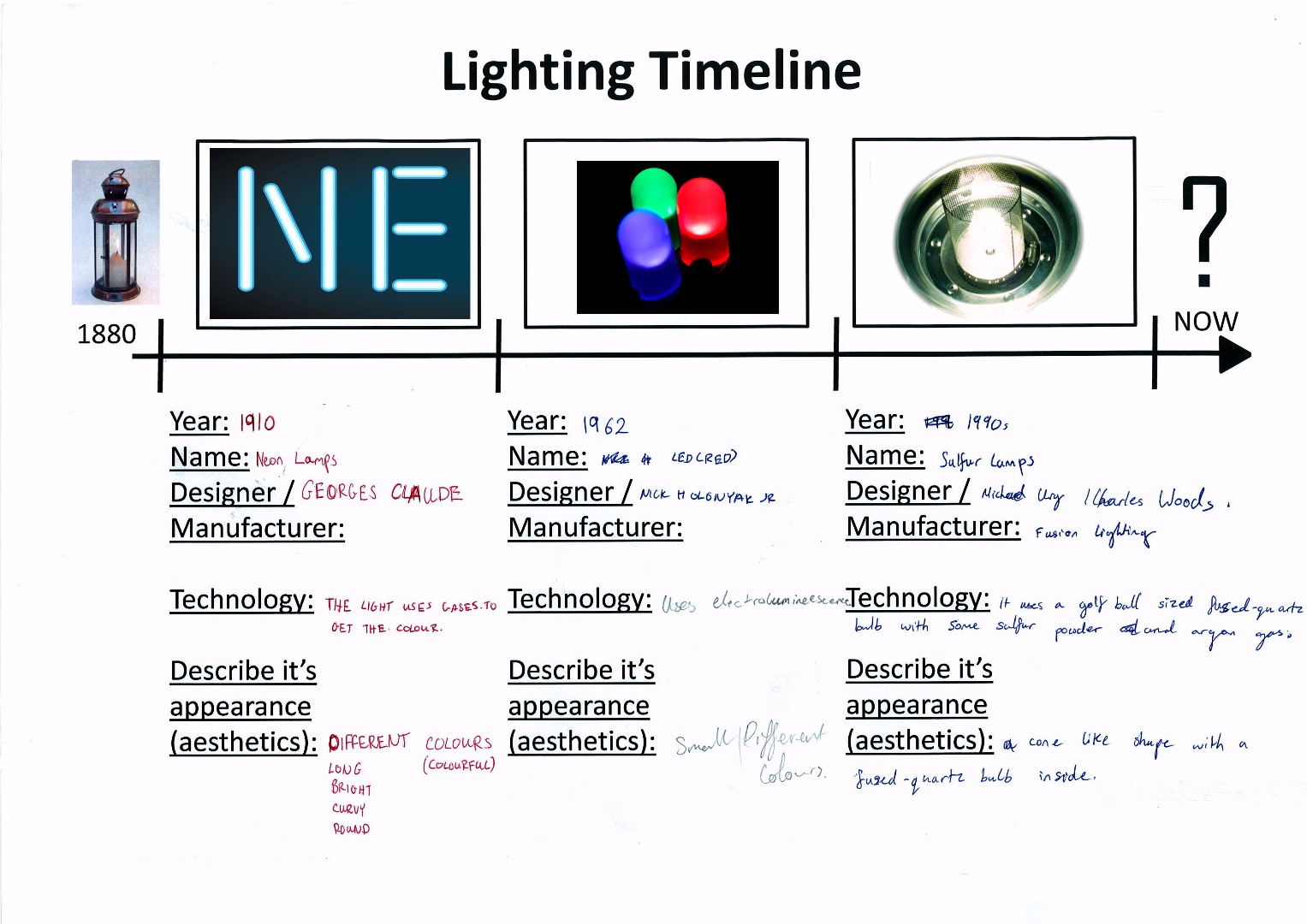 1
Annotation 1
1
Annotation 1
Includes suitable images to illustrate, in a timeline, developments in lighting 2 Annotation 2
Identifies by name, designer and the technology three significant developments in lighting technology 3 Annotation 3
Describes the aesthetic qualities of the lighting type
-
Annotations
-
1
Annotation 1
Includes suitable images to illustrate, in a timeline, developments in lighting -
2
Annotation 2
Identifies by name, designer and the technology three significant developments in lighting technology -
3
Annotation 3
Describes the aesthetic qualities of the lighting type
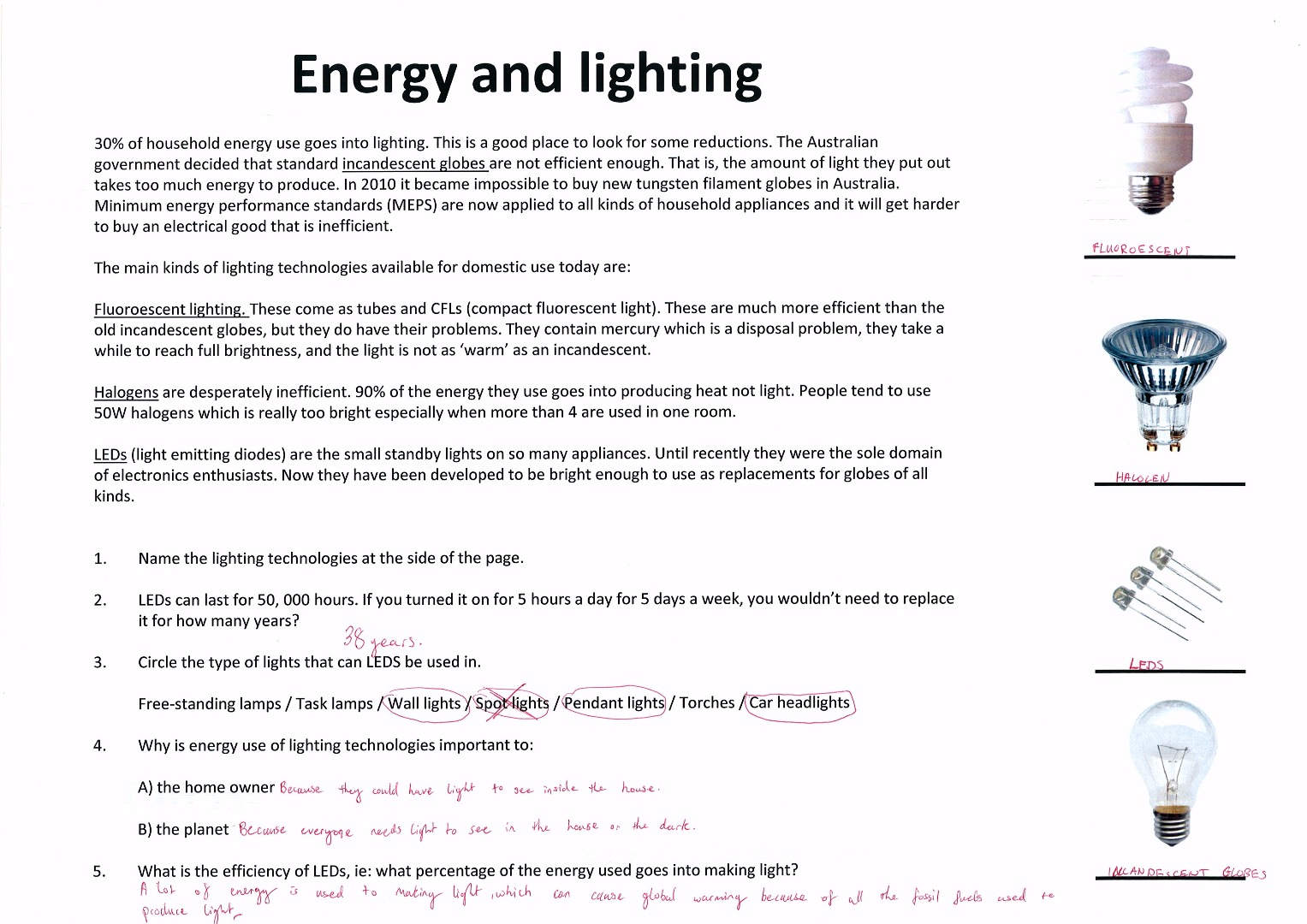 1
Annotation 1
1
Annotation 1
Labels lighting types correctly 2 Annotation 2
Demonstrates understanding of the energy efficiency of lighting technologies
-
Annotations
-
1
Annotation 1
Labels lighting types correctly -
2
Annotation 2
Demonstrates understanding of the energy efficiency of lighting technologies
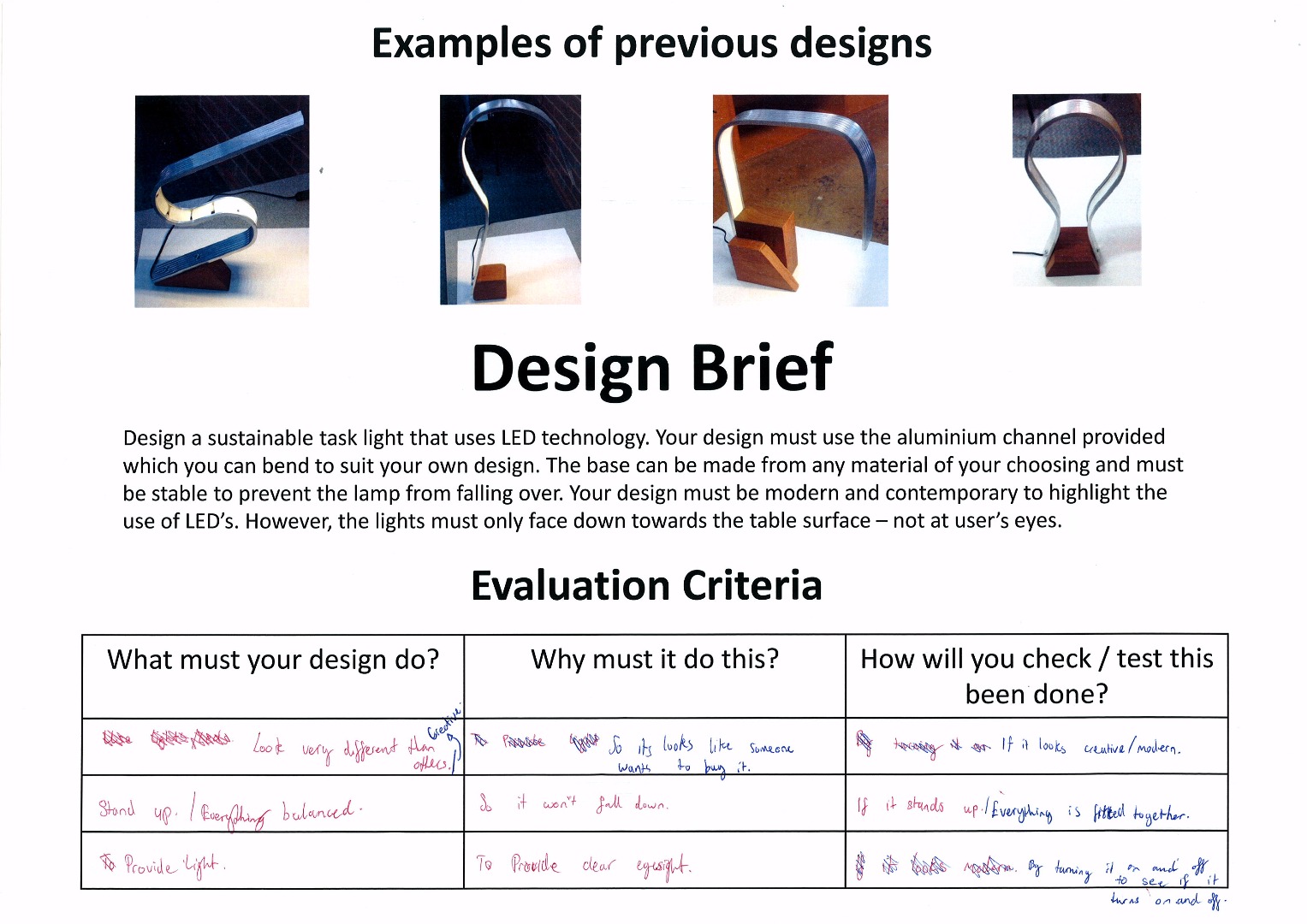 1
Annotation 1
1
Annotation 1
Identifies some functional requirements for the solution to be designed 2 Annotation 2
Indicates how the requirement will be evaluated 3 Annotation 3
Explains the importance of the functional requirements
-
Annotations
-
1
Annotation 1
Identifies some functional requirements for the solution to be designed -
2
Annotation 2
Indicates how the requirement will be evaluated -
3
Annotation 3
Explains the importance of the functional requirements
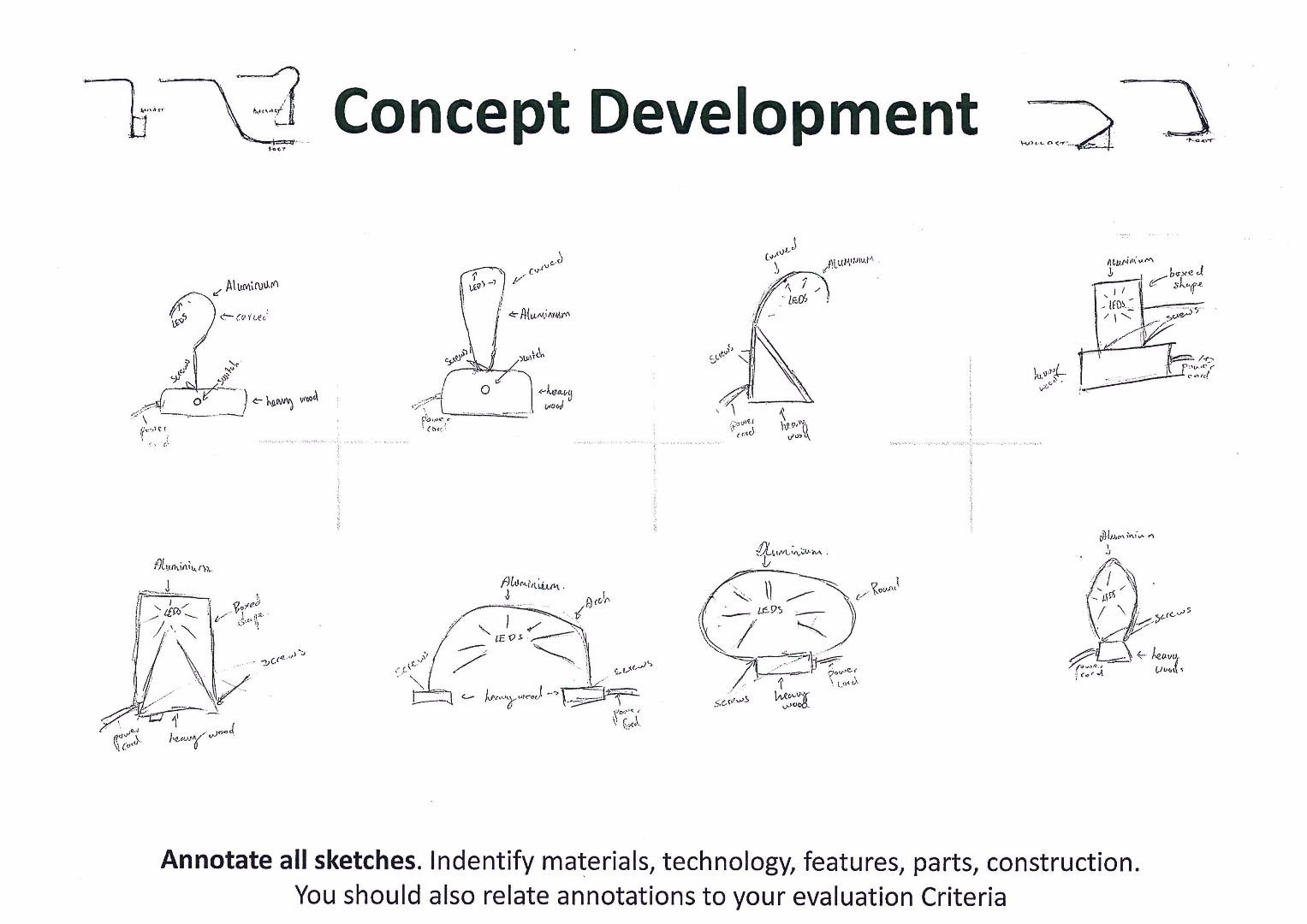 1
Annotation 1
1
Annotation 1
Sketches and annotates a range of design ideas including the labelling of materials and components 2 Annotation 2
Identifies the property of a material
-
Annotations
-
1
Annotation 1
Sketches and annotates a range of design ideas including the labelling of materials and components -
2
Annotation 2
Identifies the property of a material
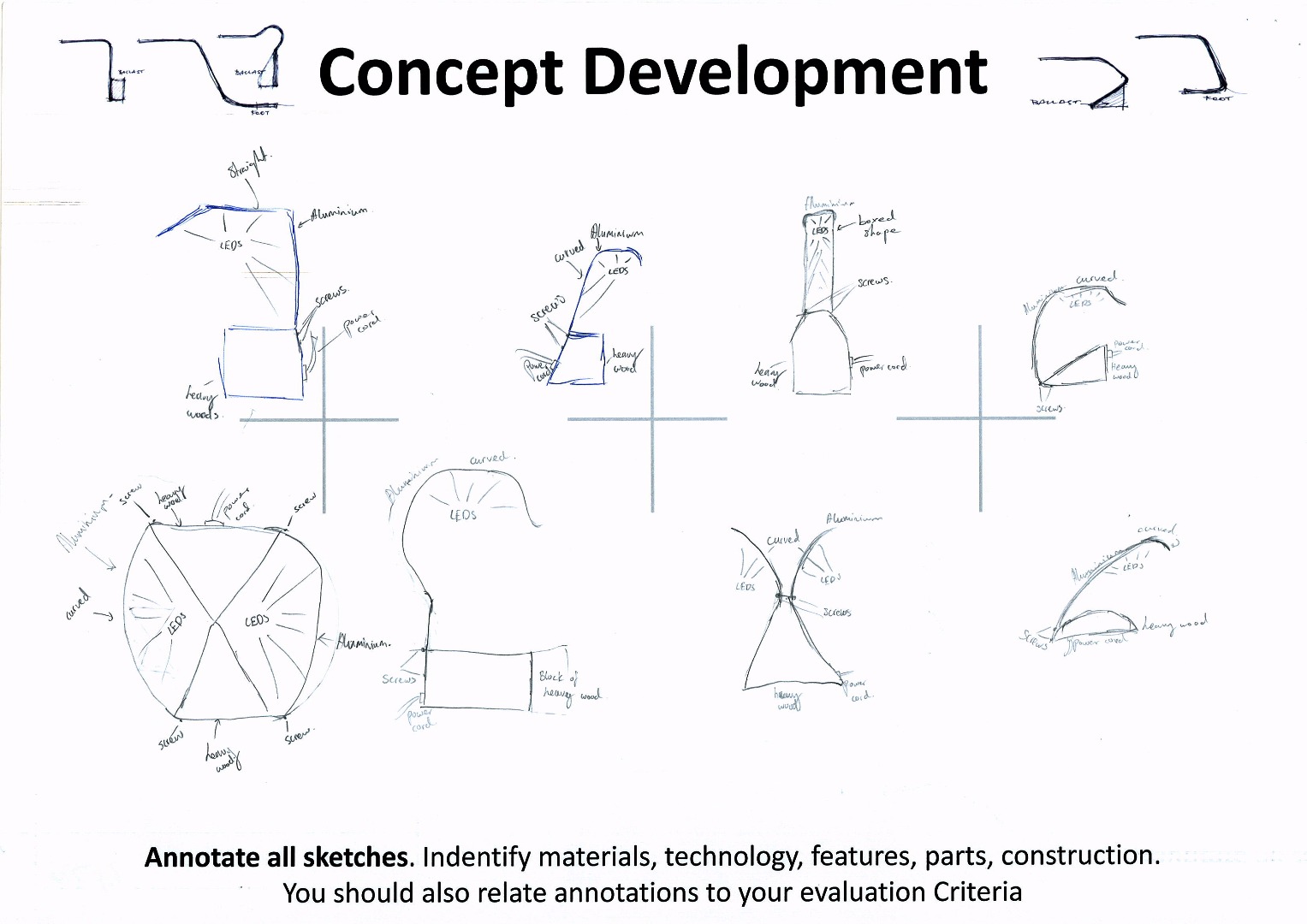 1
Annotation 1
1
Annotation 1
Refines design ideas using drawings and annotations
-
Annotations
-
1
Annotation 1
Refines design ideas using drawings and annotations
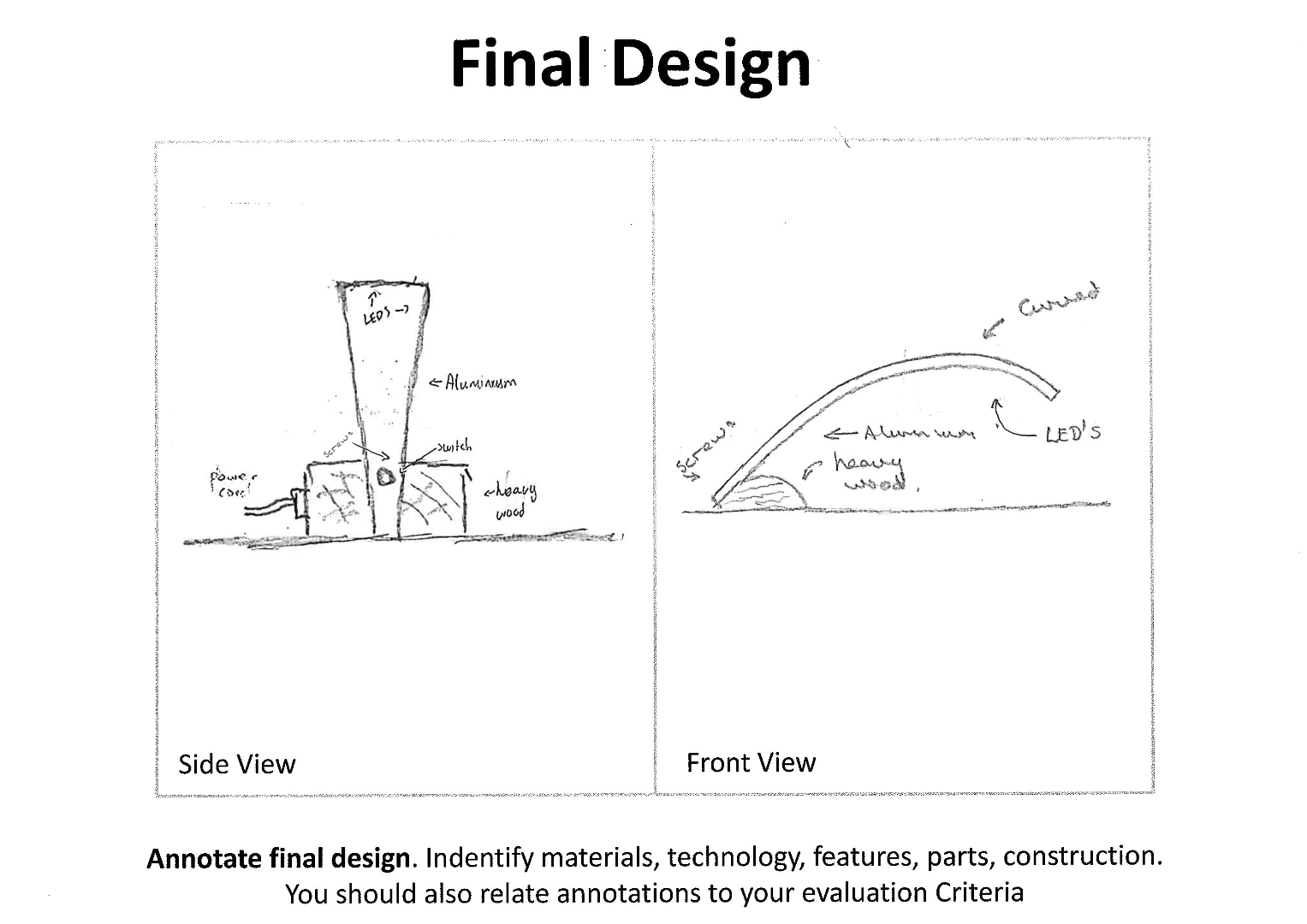 1
Annotation 1
1
Annotation 1
Produces a technical drawing of the side and front views of the designed solution
-
Annotations
-
1
Annotation 1
Produces a technical drawing of the side and front views of the designed solution
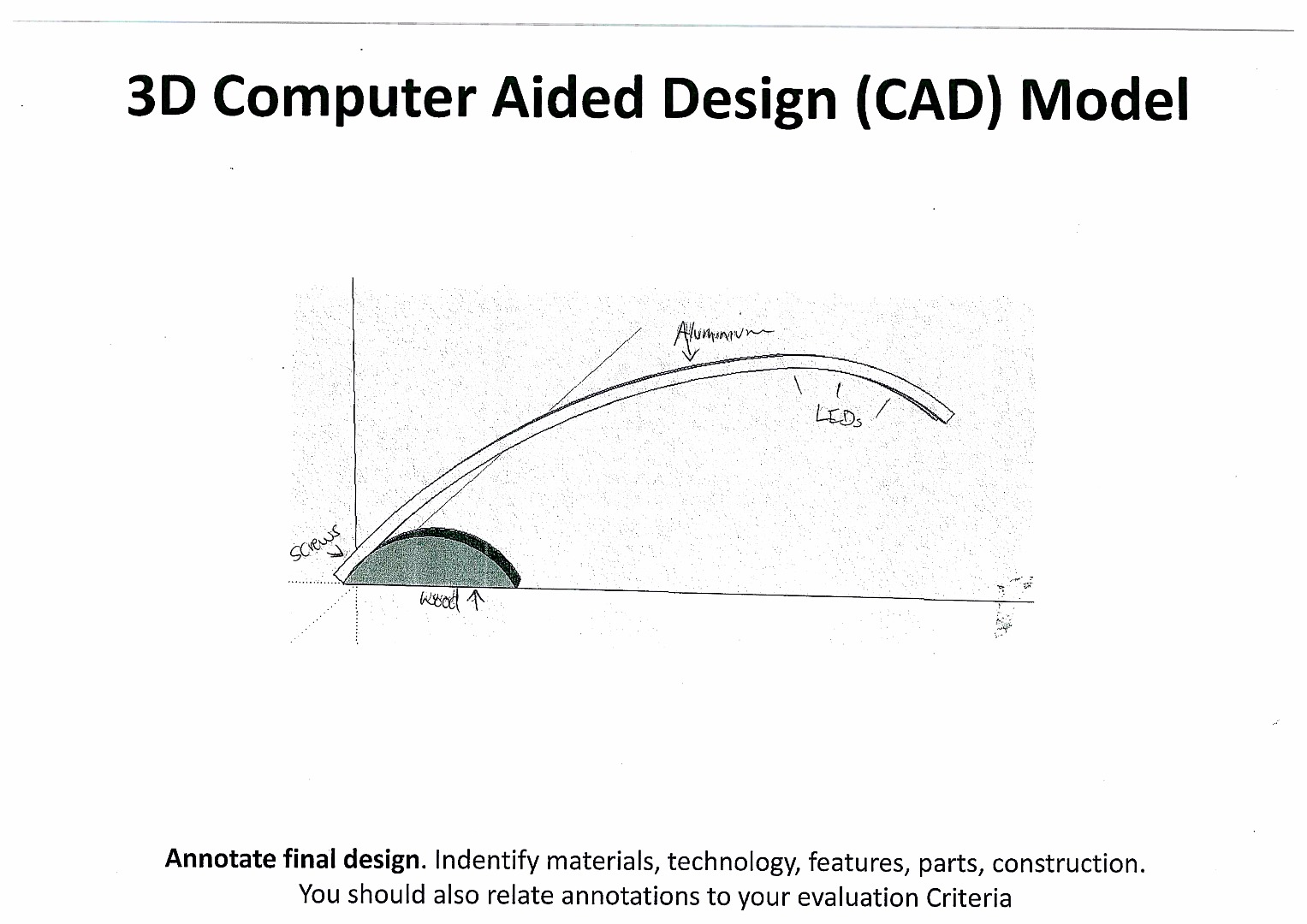 1
Annotation 1
1
Annotation 1
Produces a 3D CAD model of the designed solution and labels model
-
Annotations
-
1
Annotation 1
Produces a 3D CAD model of the designed solution and labels model
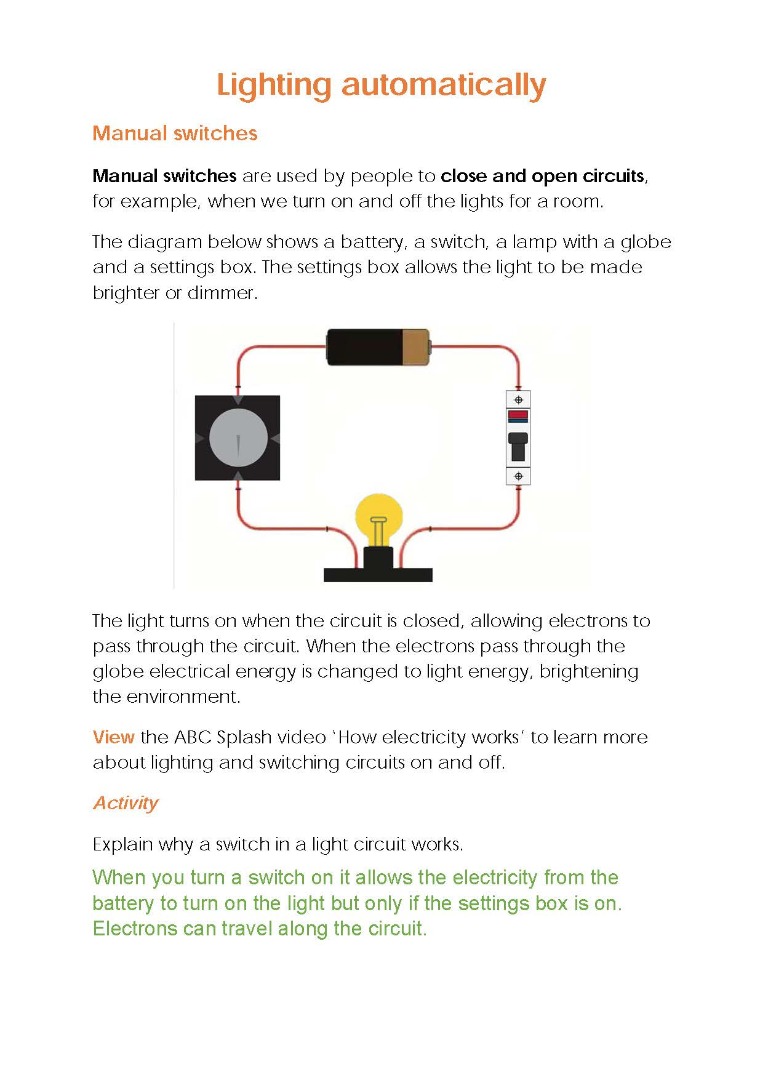 1
Annotation 1
1
Annotation 1
Explains how a light circuit works
-
Annotations
-
1
Annotation 1
Explains how a light circuit works
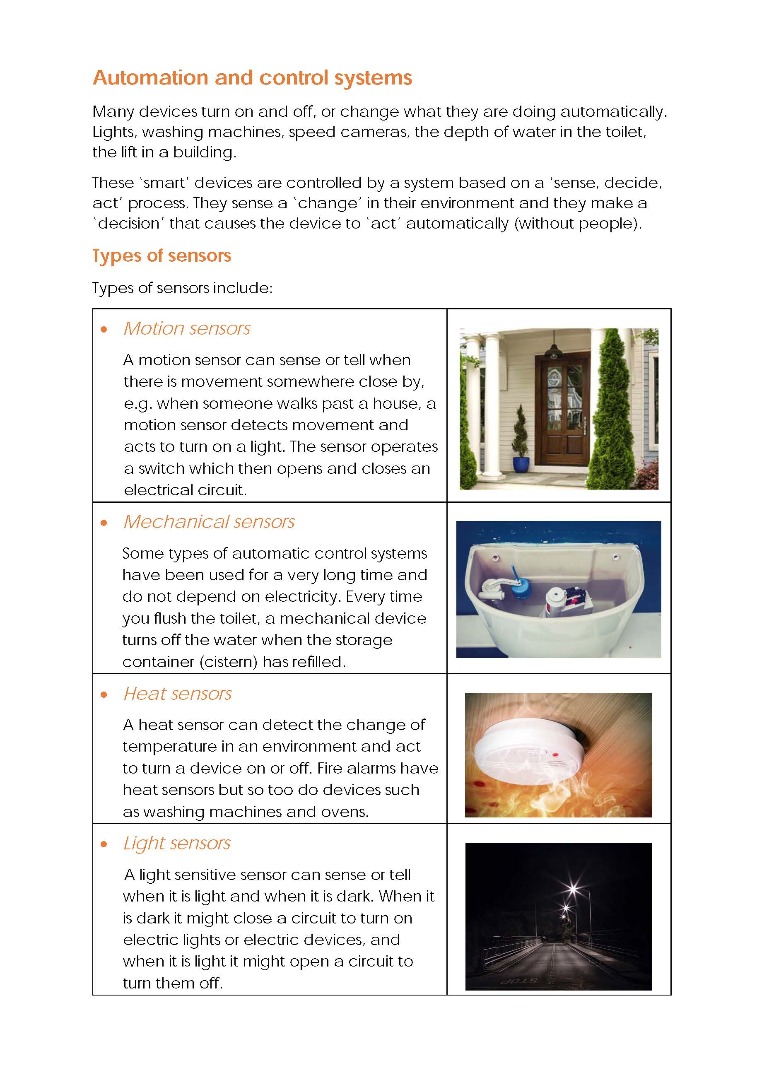
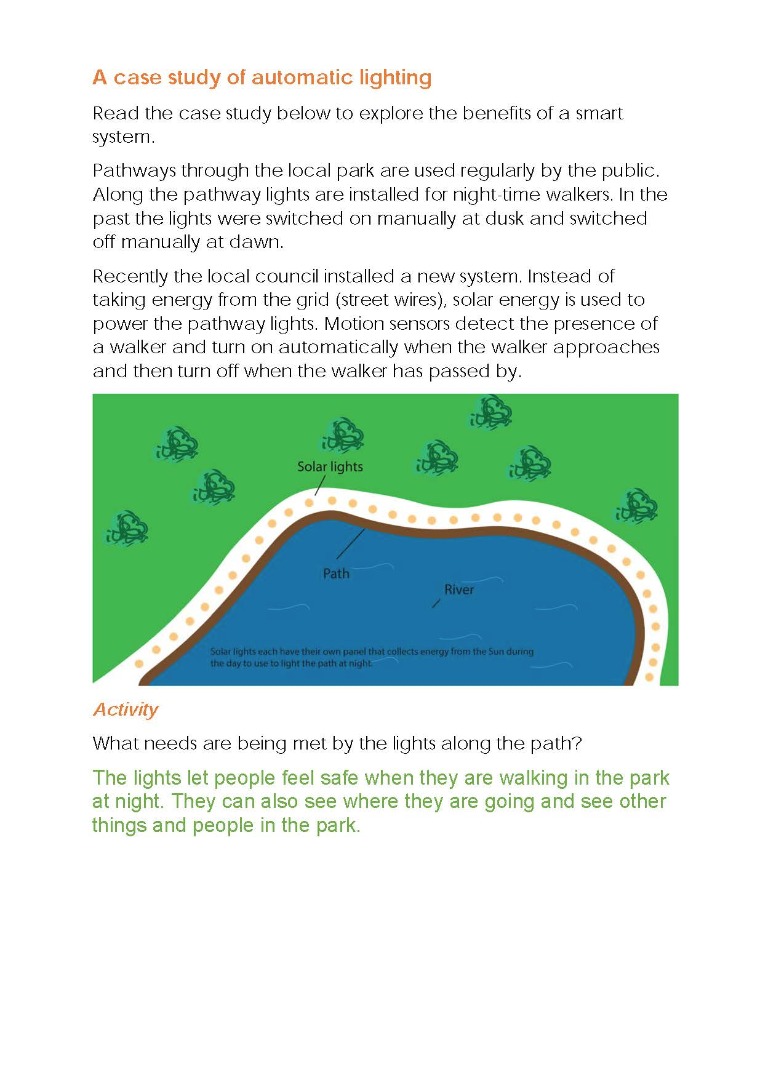 1
Annotation 1
1
Annotation 1
Identifies two needs that are being met by the designed solution
-
Annotations
-
1
Annotation 1
Identifies two needs that are being met by the designed solution
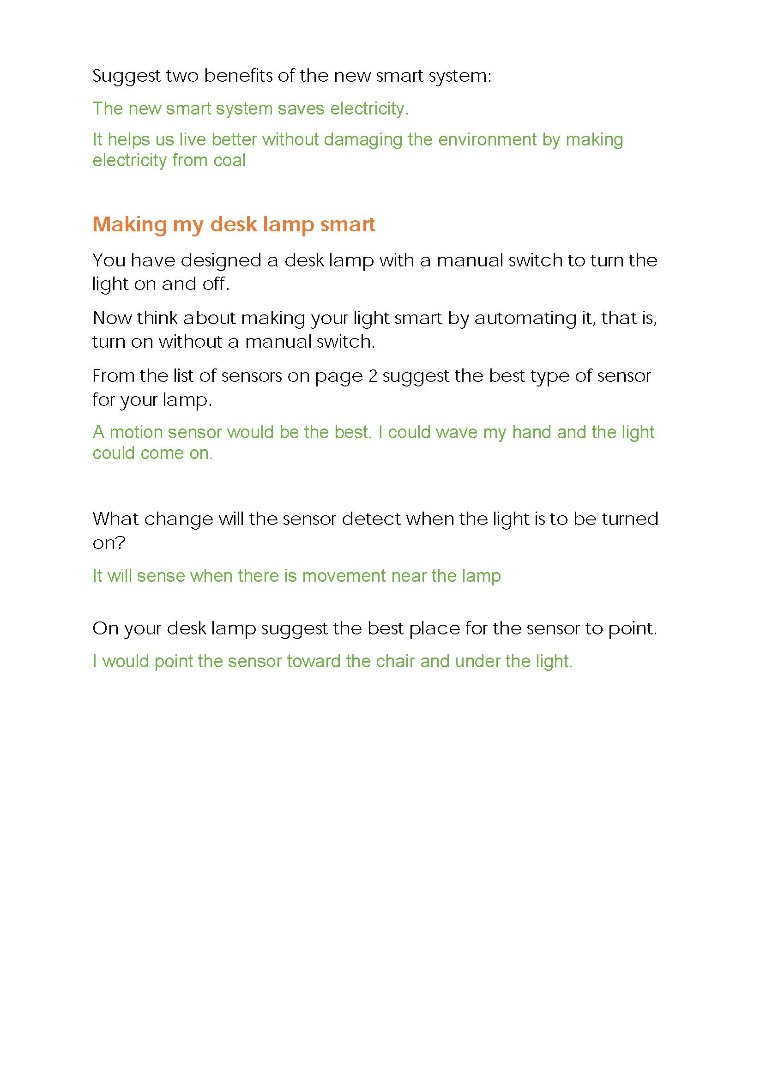 1
Annotation 1
1
Annotation 1
Explains the benefit of a control system 2 Annotation 2
Identifies the most suitable sensor for a given situation 3 Annotation 3
Explains how the sensor will work for a given situation 4 Annotation 4
Suggests an appropriate placement for the sensor
-
Annotations
-
1
Annotation 1
Explains the benefit of a control system -
2
Annotation 2
Identifies the most suitable sensor for a given situation -
3
Annotation 3
Explains how the sensor will work for a given situation -
4
Annotation 4
Suggests an appropriate placement for the sensor
Above satisfactory
Design project: Desktop lamp
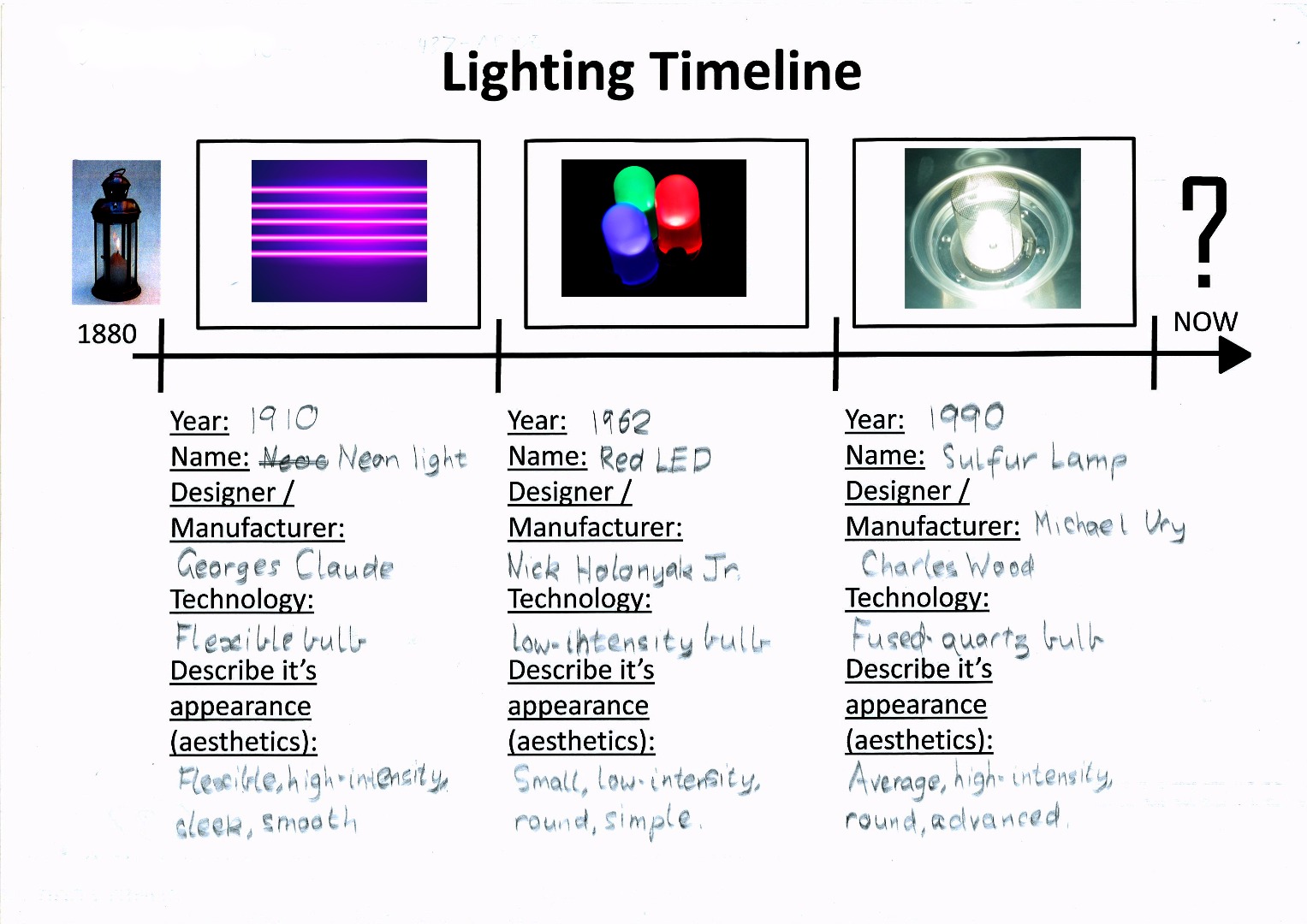 1
Annotation 1
1
Annotation 1
Includes suitable images to illustrate, in a timeline, developments in lighting 2 Annotation 2
Identifies by name, designer and the technology, three significant developments in lighting technology 3 Annotation 3
Describes clearly the aesthetic qualities of the lighting type
-
Annotations
-
1
Annotation 1
Includes suitable images to illustrate, in a timeline, developments in lighting -
2
Annotation 2
Identifies by name, designer and the technology, three significant developments in lighting technology -
3
Annotation 3
Describes clearly the aesthetic qualities of the lighting type
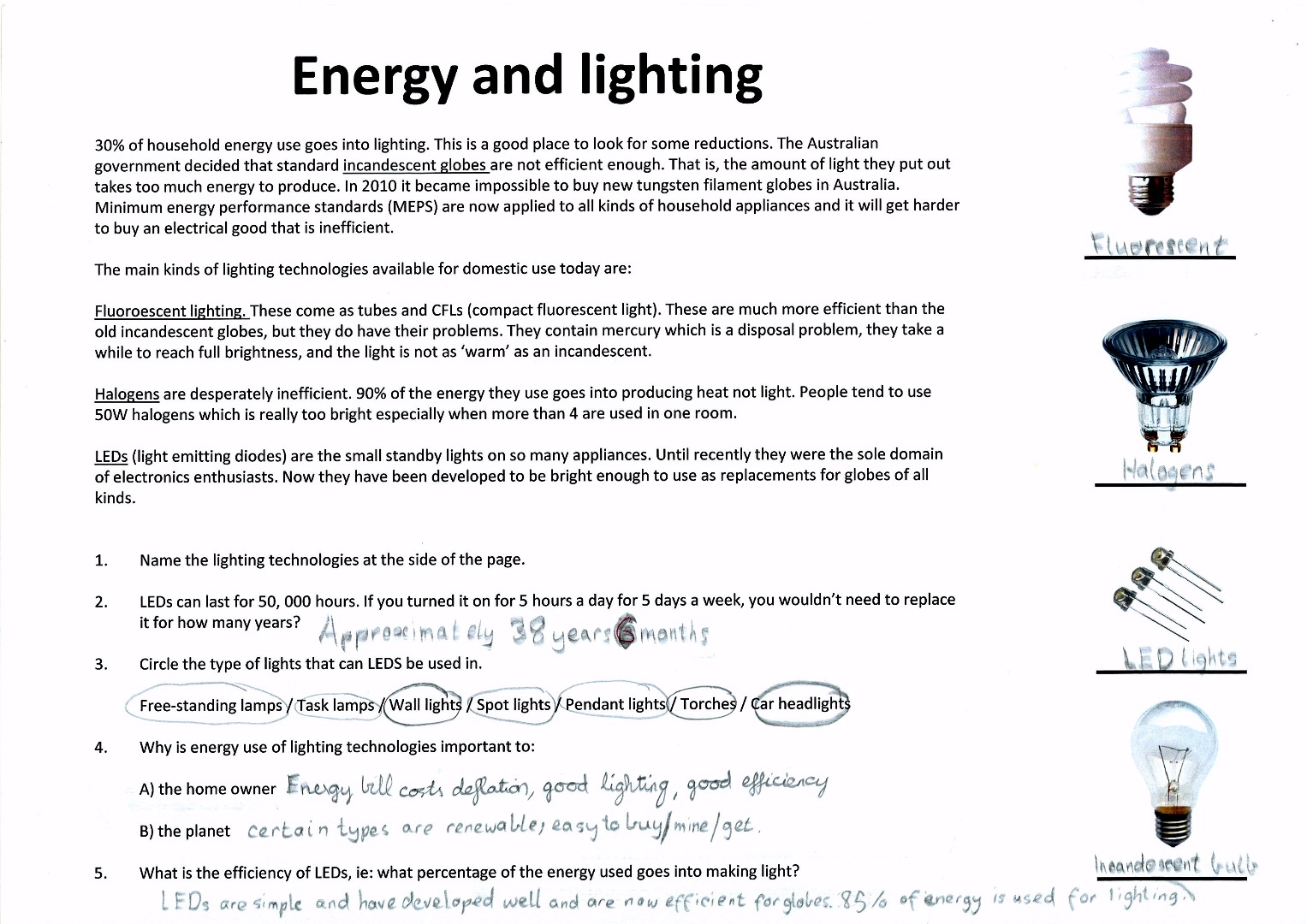 1
Annotation 1
1
Annotation 1
Labels lighting types correctly 2 Annotation 2
Demonstrates sound understanding of the energy efficiency of lighting technologies
-
Annotations
-
1
Annotation 1
Labels lighting types correctly -
2
Annotation 2
Demonstrates sound understanding of the energy efficiency of lighting technologies
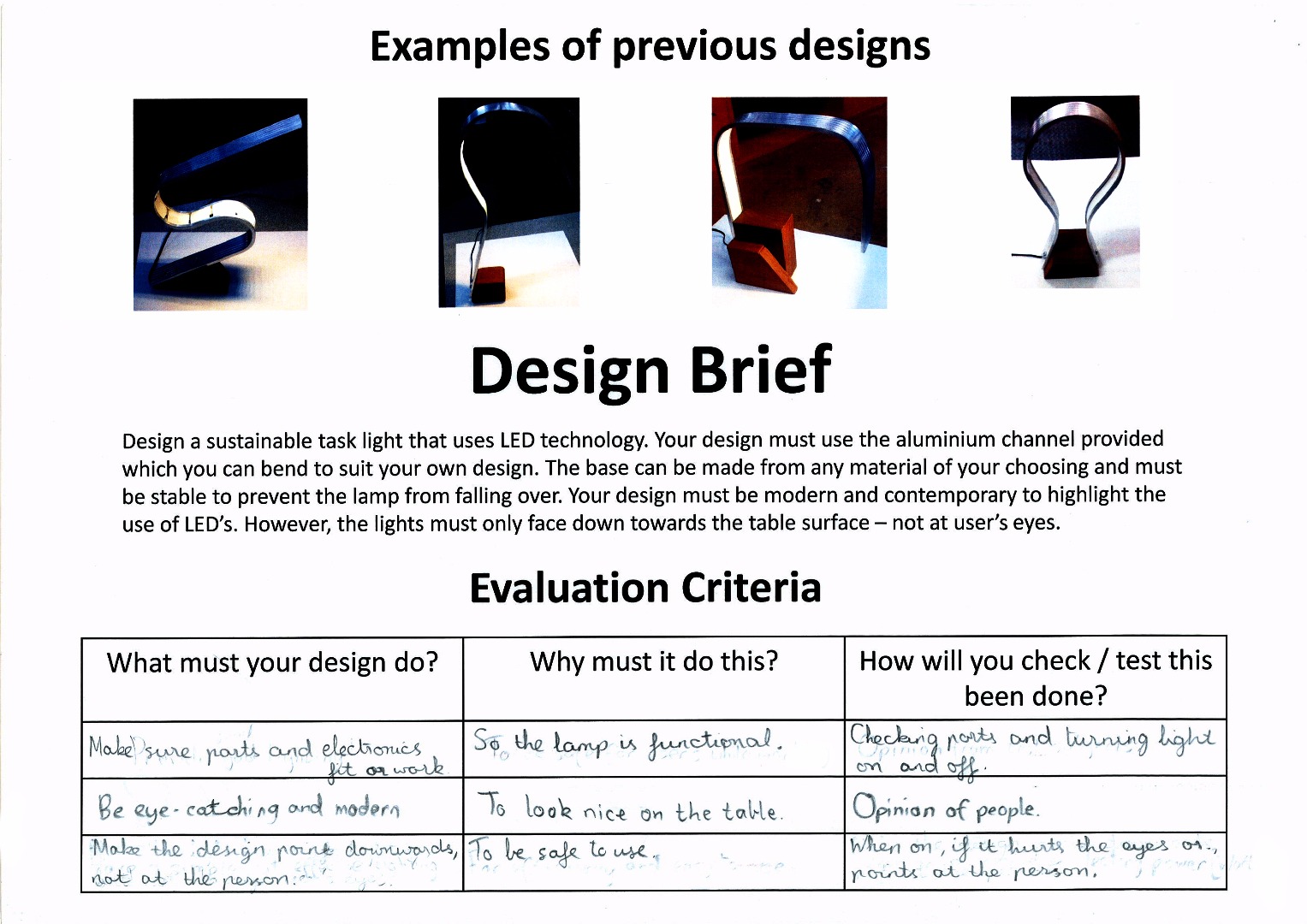 1
Annotation 1
1
Annotation 1
Explains how the requirement will be evaluated 2 Annotation 2
Identifies appropriate functional requirements for the solution to be designed 3 Annotation 3
Explains clearly the importance of the functional requirements
-
Annotations
-
1
Annotation 1
Explains how the requirement will be evaluated -
2
Annotation 2
Identifies appropriate functional requirements for the solution to be designed -
3
Annotation 3
Explains clearly the importance of the functional requirements
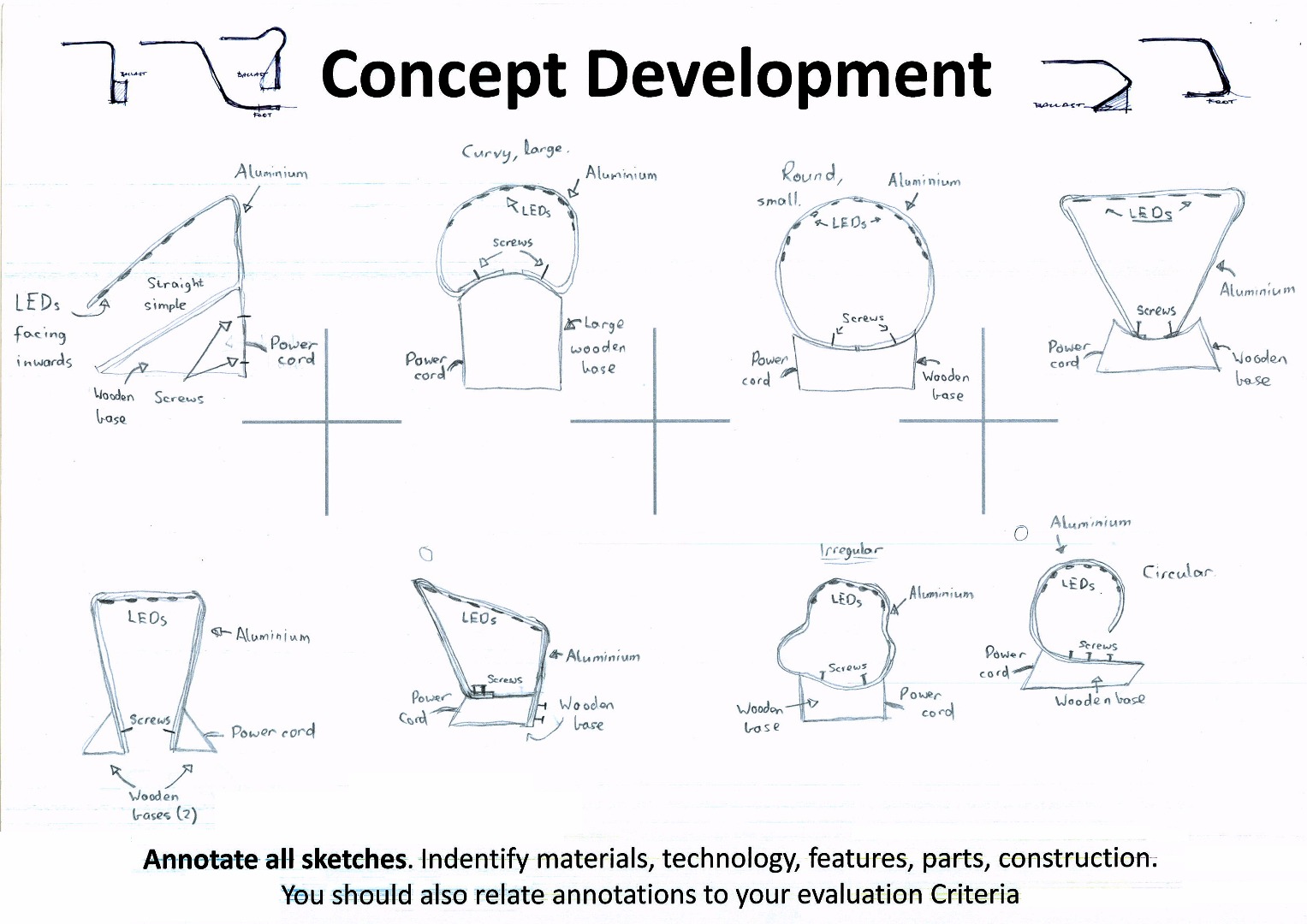 1
Annotation 1
1
Annotation 1
Sketches clearly and annotates a range of design ideas including the labelling of materials and components
-
Annotations
-
1
Annotation 1
Sketches clearly and annotates a range of design ideas including the labelling of materials and components
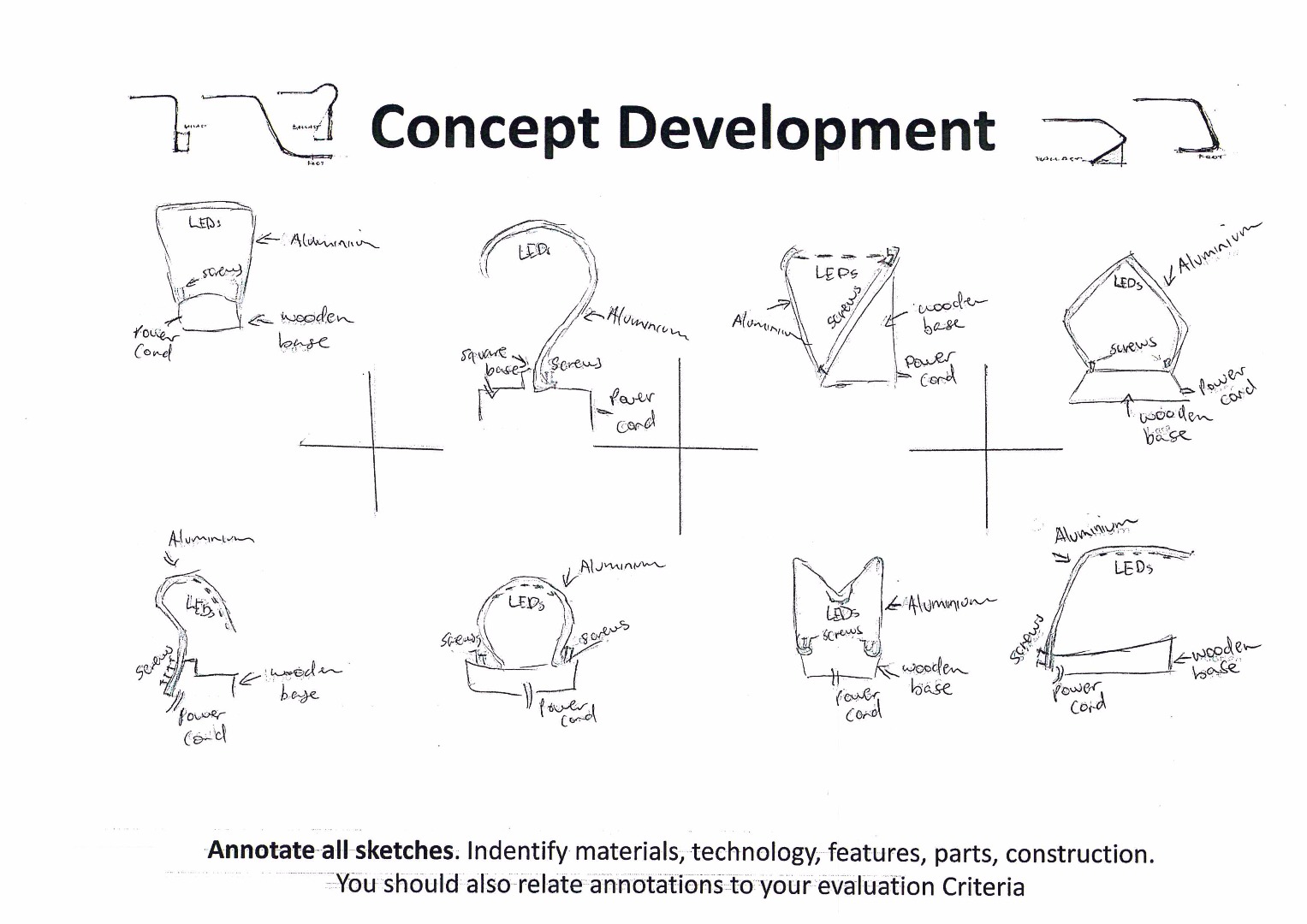 1
Annotation 1
1
Annotation 1
Indicates clearly how components are joined 2 Annotation 2
Refines design ideas using drawings and annotations
-
Annotations
-
1
Annotation 1
Indicates clearly how components are joined -
2
Annotation 2
Refines design ideas using drawings and annotations
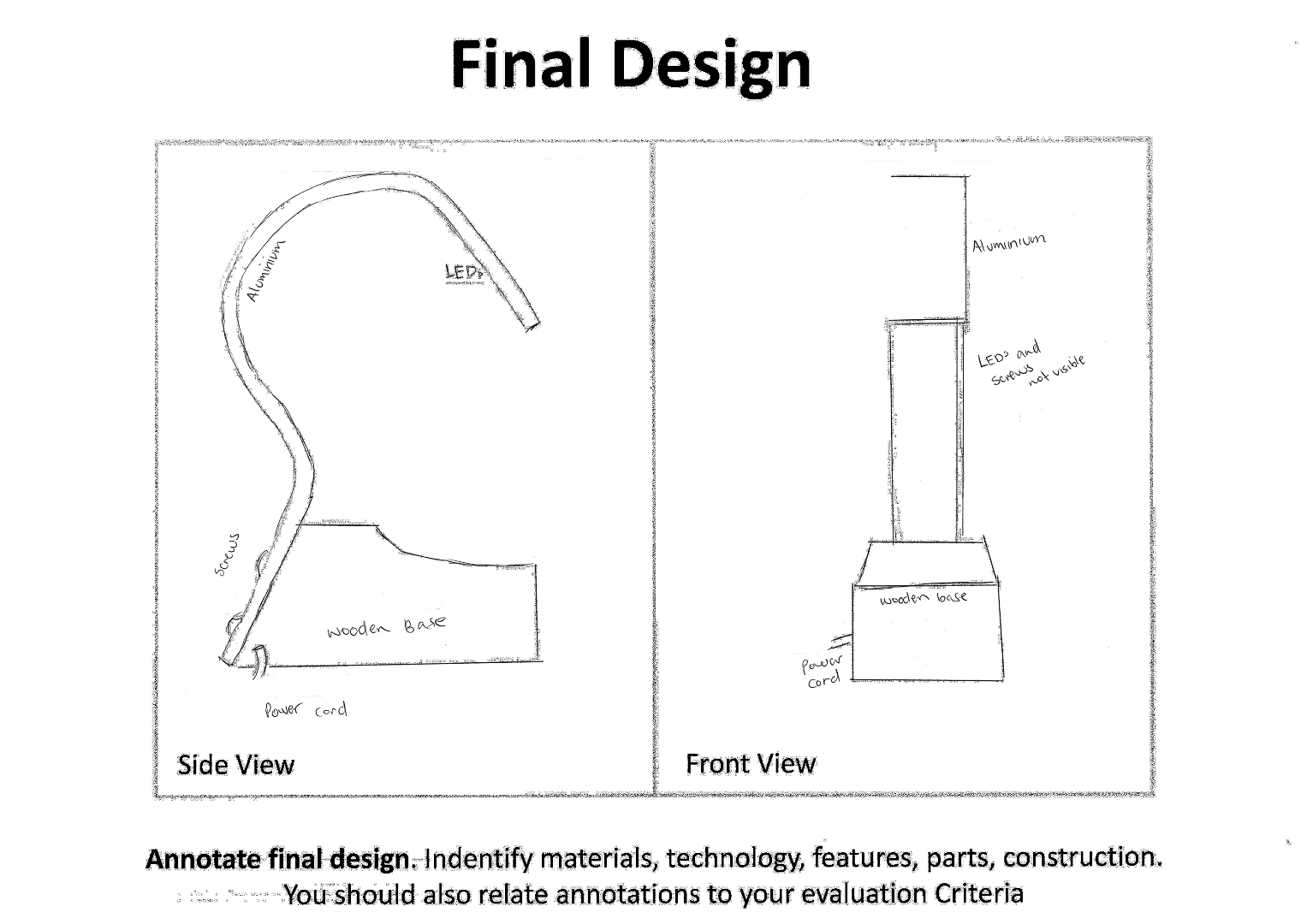 1
Annotation 1
1
Annotation 1
Draws an accurate technical drawing of the side and front views of the designed solution
-
Annotations
-
1
Annotation 1
Draws an accurate technical drawing of the side and front views of the designed solution
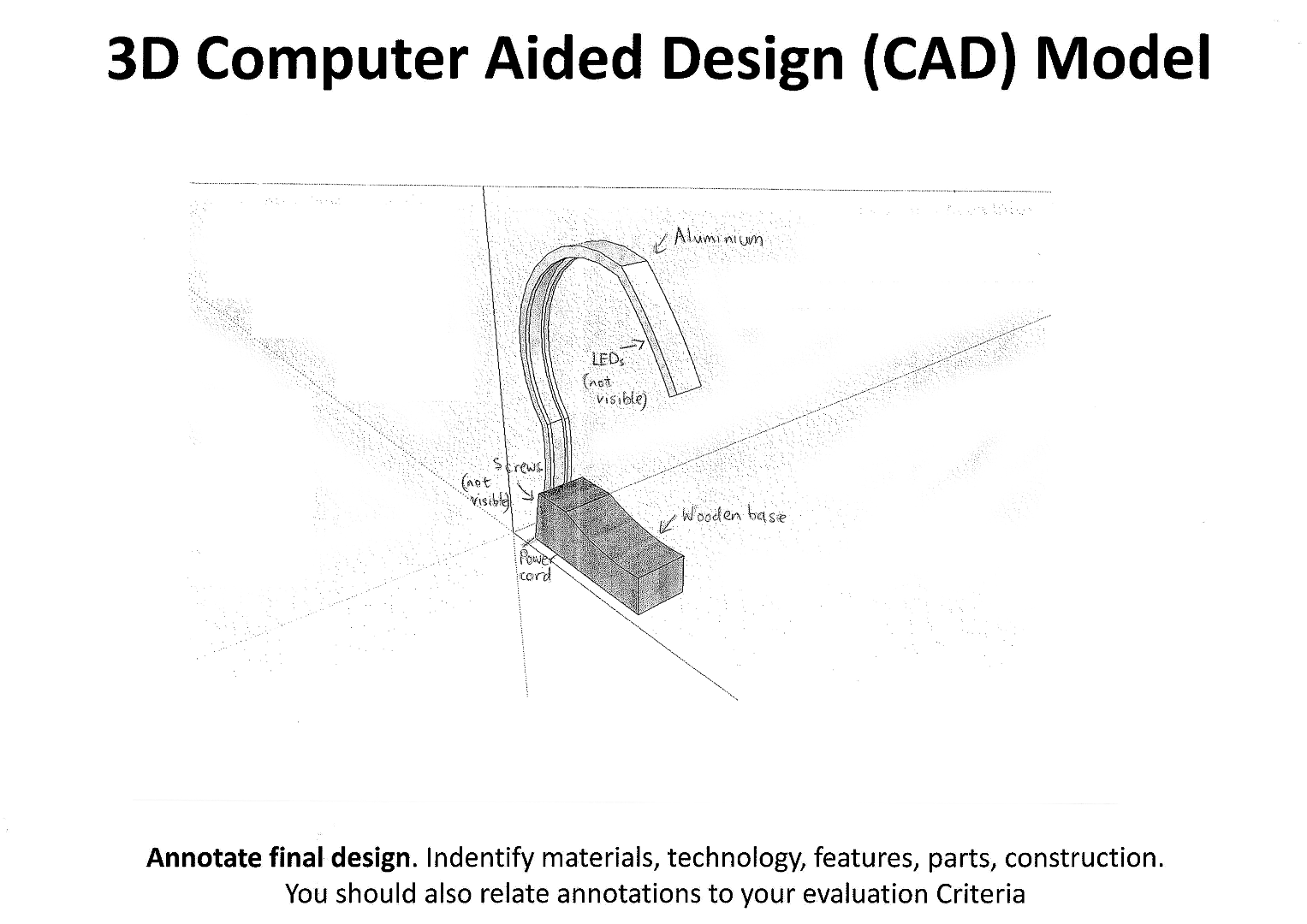 1
Annotation 1
1
Annotation 1
Produces a 3D computer-aided design (CAD) model of the designed solution using a perspective view and labels model 2 Annotation 2
Uses a 3D computer-aided design (CAD) application to model and label a designed solution
-
Annotations
-
1
Annotation 1
Produces a 3D computer-aided design (CAD) model of the designed solution using a perspective view and labels model -
2
Annotation 2
Uses a 3D computer-aided design (CAD) application to model and label a designed solution
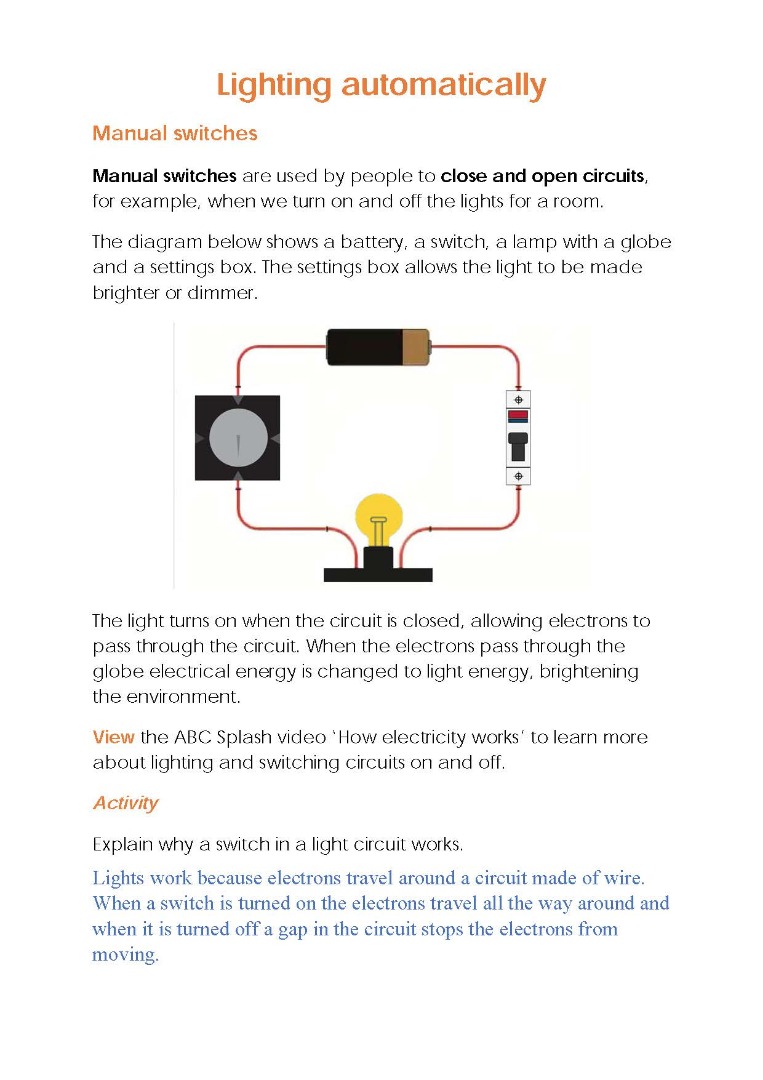 1
Annotation 1
1
Annotation 1
Explains clearly how a light circuit works
-
Annotations
-
1
Annotation 1
Explains clearly how a light circuit works
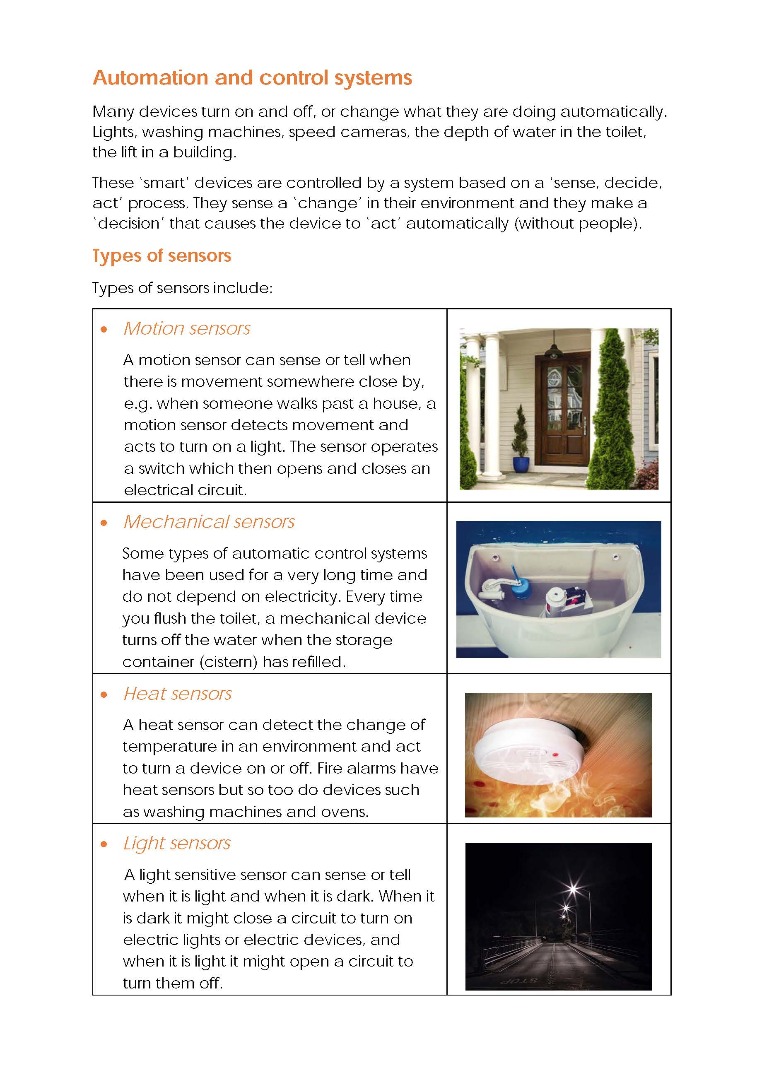
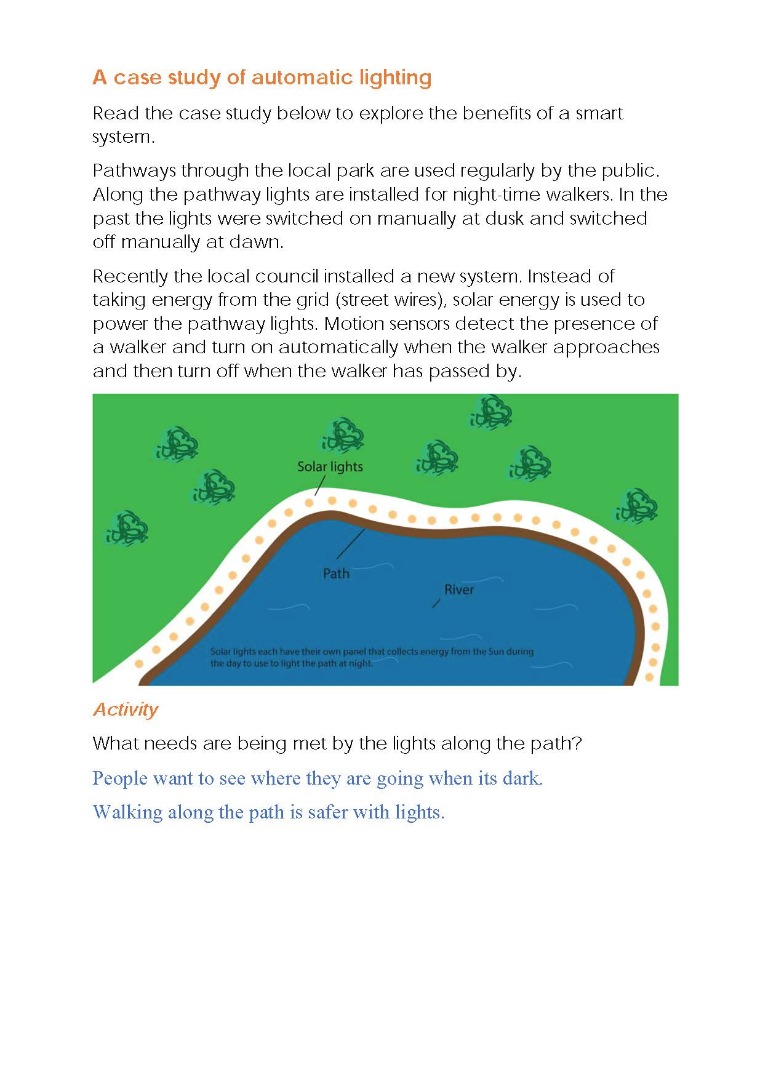 1
Annotation 1
1
Annotation 1
Identifies two needs that are being met by the designed solution
-
Annotations
-
1
Annotation 1
Identifies two needs that are being met by the designed solution
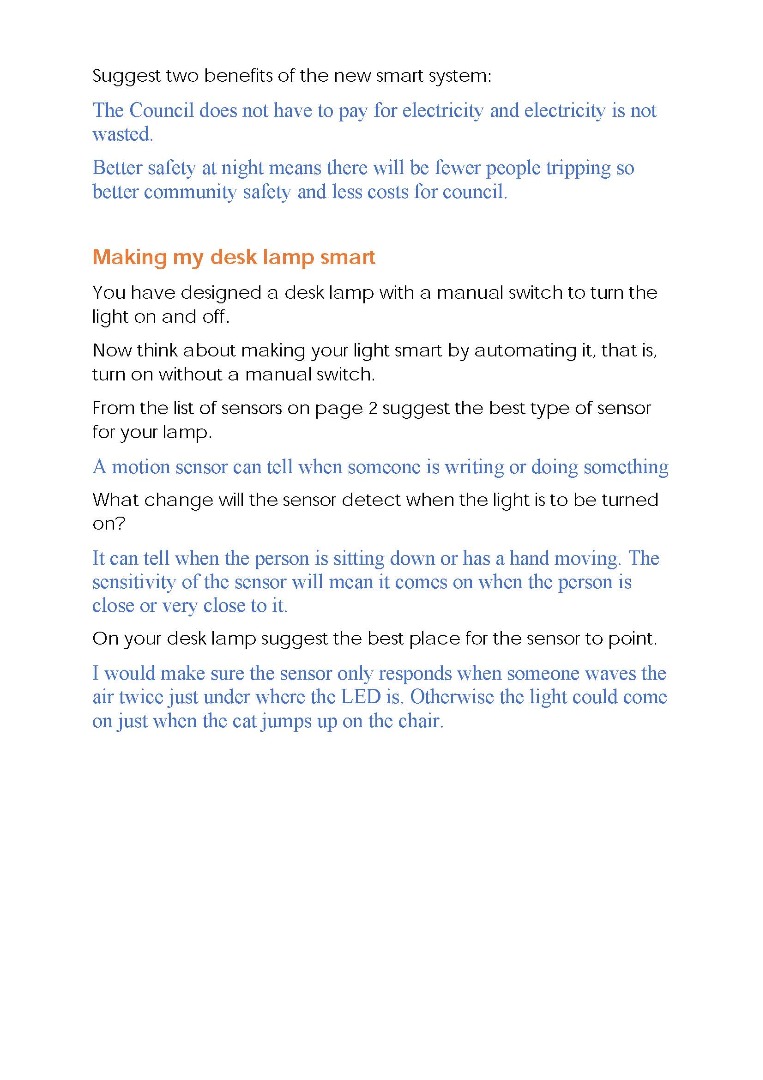 1
Annotation 1
1
Annotation 1
Explains clearly two benefits of a control system 2 Annotation 2
Identifies the most suitable sensor for a given situation 3 Annotation 3
Explains how the sensor will work for a given situation 4 Annotation 4
Suggests and justifies the placement of the sensor
-
Annotations
-
1
Annotation 1
Explains clearly two benefits of a control system -
2
Annotation 2
Identifies the most suitable sensor for a given situation -
3
Annotation 3
Explains how the sensor will work for a given situation -
4
Annotation 4
Suggests and justifies the placement of the sensor
Below satisfactory
Design project: Desktop lamp

 1
Annotation 1
1
Annotation 1
Uses generic terms to label some lighting technologies
-
Annotations
-
1
Annotation 1
Uses generic terms to label some lighting technologies
 1
Annotation 1
1
Annotation 1
Indicates how the requirements will be evaluated 2 Annotation 2
Identifies a functional requirement for the solution to be designed 3 Annotation 3
Explains the importance of the requirements that have been identified
-
Annotations
-
1
Annotation 1
Indicates how the requirements will be evaluated -
2
Annotation 2
Identifies a functional requirement for the solution to be designed -
3
Annotation 3
Explains the importance of the requirements that have been identified
 1
Annotation 1
1
Annotation 1
Produces line drawings of some design ideas and annotates them to indicate some materials and components
-
Annotations
-
1
Annotation 1
Produces line drawings of some design ideas and annotates them to indicate some materials and components
 1
Annotation 1
1
Annotation 1
Uses drawings and annotations to refine design ideas
-
Annotations
-
1
Annotation 1
Uses drawings and annotations to refine design ideas
 1
Annotation 1
1
Annotation 1
Sketches a side view and front view of the designed solution
-
Annotations
-
1
Annotation 1
Sketches a side view and front view of the designed solution

 1
Annotation 1
1
Annotation 1
States the relationship between two components of a light circuit
-
Annotations
-
1
Annotation 1
States the relationship between two components of a light circuit

 1
Annotation 1
1
Annotation 1
States a reason for the lights
-
Annotations
-
1
Annotation 1
States a reason for the lights
 1
Annotation 1
1
Annotation 1
Identifies a benefit of the control system
-
Annotations
-
1
Annotation 1
Identifies a benefit of the control system